Auctions raise money and mark the announcement of “Our Might” campaign


This year parents, teachers, alumni and performers gathered in an extravagant display of a celebration of the Masters community, known as the Spring Gala. Planned by the Parents Association (PA), the advancement office, and Amie Servino Head of Parent Engagement, this event happens every three years. But due to COVID-19 canceling the 2020 Gala, this is the first time the event has taken place since 2017. But behind all of the glitz and glamor are months of preparation, planning the venue, the theme, and arranging for all the people who attend.
Servino worked closely with Jennifer Nappo, Gala Chair and parent of the class of 2023, who was in charge of communicating with the Parents Association for this event. Alongside volunteers from the PA, the committee of volunteers chose the theme of “Our Might”.
Servino explains the significance behind the theme. “As a community of all different people of talent and backgrounds, when we come together collectively with our might we are able to support our students, program and campus.”
This year, the funding proceeds for this event will go to three priorities: financial aid, performing arts, and technology. A handful of events allowed attendees to donate varying amounts of money. These activities include a live auction, a silent auction, and a paddle raise.
The process of forming the auction starts with a call out to the Masters community. Willing members of the community have the opportunity to have some of their items or unique ex-
periences auctioned off in support of the school. Some of the big ticket items included this year were Taylor Swift tickets, front-row tickets for the upcoming years of graduation, dinner with Michael Douglas (actor and father of alumni Dylan Douglas ‘18), and even a private screening of the upcoming Martin Scorsese movie in his private studio.
Sources who attended the Gala reported to Tower the combined take on the Taylor Swift tickets, the private viewing experience, dinner with Michael Douglas and private music esson with renowned
ers the amount of money. Those who raise a paddle will donate that amount that is up at the time of their raise.
“Our goal is for everyone to feel that if they want to support the school they can, no matter the dollar amount,” Servino said.
Servino explained that this Gala was intended to be available to all members of the community no matter their financial background.
“We have been able to work with Andy Scheider, the school CFO, and through the generosity of parents we have been able to offer financial aid assistance for families that want to attend.”
A total of 438 parents, teachers, and alumni attended. Servino said that this large undertaking was made easier by the people around her.
“This is a very different event than the one we had in 2017 but I don’t think it has been more difficult to plan - but that is because Jen has worked on our 2017 event and has a background with special events and there was a lot of expertise just from the committee itself.”
ten by DioGuardi and recorded by Kelly Clarkson as a chart topper in 2015.
The chair of DOPA, Jennifer Carnevale, believes that it is important for these performances to be displayed. “It was important for us to participate in this so that people can see what they are contributing to clearly.”
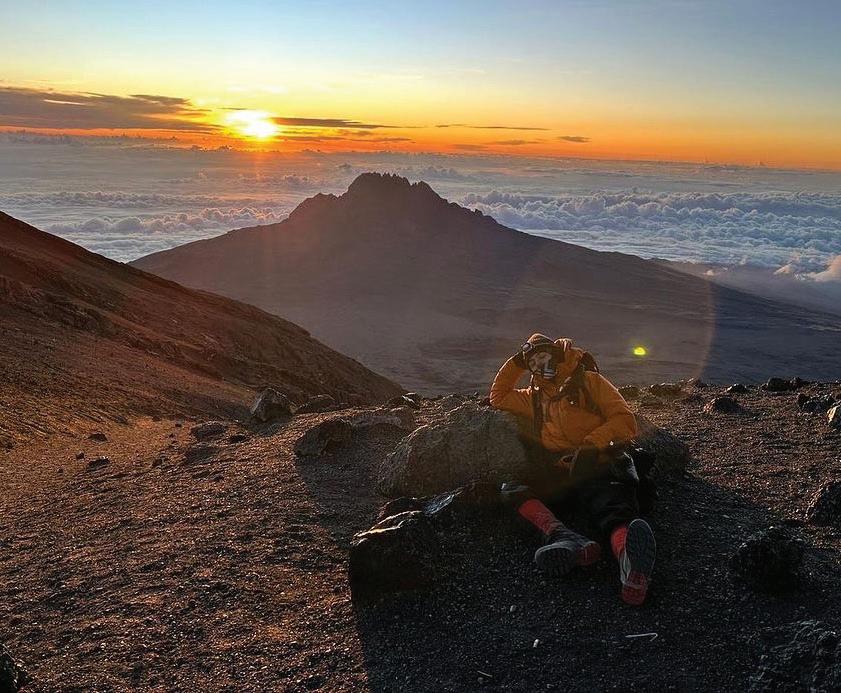
Saxophonist for the Great Gig and the Spring Gala Lucas Camacho ‘25 saw the experience of performing for this big event as fairly low-stress and exciting. “Everybody was pretty non judgemental and open to having fun, so for me it was just another
great performance with some friends.”
After a total of six months worth of preparation, the Spring Gala was was enjoyed by all on Thursday, April 20.

Looking forward to the future, the money raised from the Gala means that the potential projects of renovating Strayer Hall and the Claudia Boettcher Theater are one step closer to reality.
These changes will be enabled through a new funding campaign called “Our Might”. The recent renovation of the Library, Strong, Thompson, Ford, McCormack, and Cole dorms, and the creation of The Innovation and Entre-
preneurship Center are four of the six transformational priorities along with Strayer and the Boettcher Theater. Christie sees these renovations as a huge boost to the school.
“I am very happy about proceeds potential going to Strayer because I think we have a very strong performing arts department but we don’t have the resources that we should.”

“I wish that I could use the building now…but I am excited for my sister to potentially use it in the future.”

songwriter, singer, alumni, and parent Kara DioGuardi raised over 40,000 dollars. The planning committee didn’t disclose the final auction value of each of these items to protect the privacy of the buyers. Both of these auctions were run by a professional auctioneer and brought together with the help of Jodie Smith, the PA auction chair.
The paddle raise acts as a more straightforward way to donate to the priorities at hand. The auctioneer starts high in value and gradually low-
Alongside the advancement office, DOPA (the Department of Performing Arts) was a major part in the planning and execution of this event. Over 60 students from both the Middle and theUpper school were involved in five separate performances over the four-hour event. These groups include string ensemble, chamber music ensemble, Great Gig performers and even a performance with Kara DioGuardi. Alongside DioGuardi, Katherine Christie ‘23, Angel Henriquez ‘24, Kat Benson ‘27 and DOPA teacher John Alec-Raubeson DioGuardi performed “Heartbeat Song” writ-
Glitz, glamour, and giving, highlight first Spring Gala since 2017 Amendment passes, but differences of opinion remain
On April 19, Diversity
Ambassadors Angelica Lopez-Tucker and Arjun Ratan proposed a bill that aimed to represent more marginalized groups in student government positions. After months of hard work, and getting approval from the Executive Committee (EC), the Ambassadors introduced the
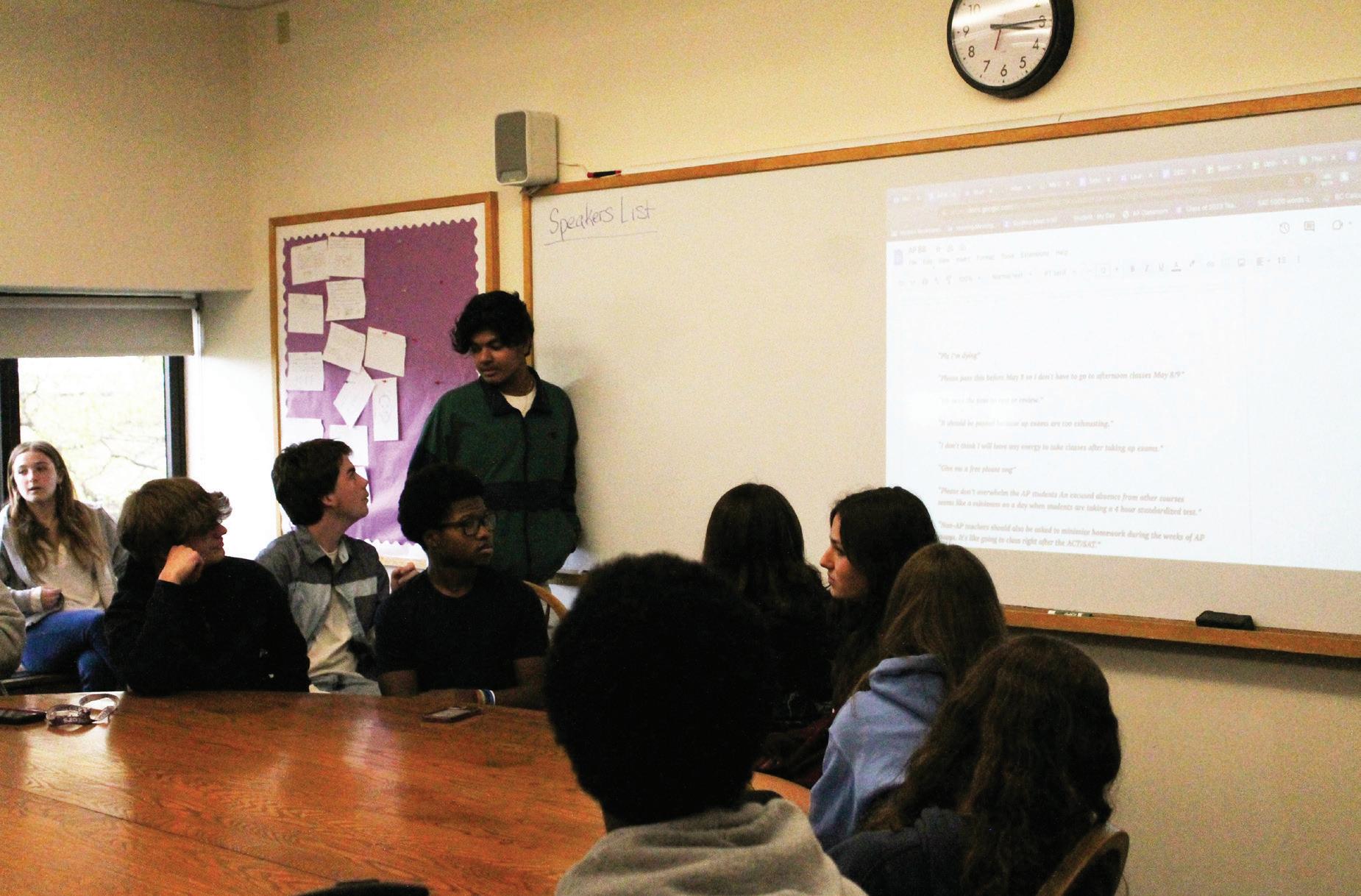
bill at Morning Meeting, explained the rationale, and asked every student and faculty member to vote, as over half of the school population had to vote including all the faculty and staff), and then a two thirds majority had to vote in favor of it, in order for the proposed amendment to to go into effect.
The bill, an amendment to the school’s constitution, went through the process of drafting and Executive Committee votes, before being presented to the Upper School, the only amendment to be raised this school year. It proposes the addition of two new stu -
dent government positions named Diversity Ambassador Co-Chairs chosen through an application and selection process by the Associate Director of Diversity, Equity & Inclusion (DEI) Selas Douglas and Director of DEI Roland Davis. The qualified candidates will then be elected by Diversity Ambassadors from within the group. The poll was open for three days, during which over 50 percent of the community voted for the amendment. According to Lopez-Tucker, out of those who participated, around 90 percent voted in favor of the bill.
Both of the ambassadors, along with Juan Torres who cowrote the bill, have been considering this change for a long time as it would create voting members dedicated to the DEI aspect of all EC discussions. Torres said, “Angelica said that she was considering diversity, equity, and inclusion as a day student rep, but that’s not a day student rep’s job. So we thought it was best to have a dedicated position that will always consider DEI.”
a stand or stopping what was going on.” She said she felt Heredia abused his senior speech time and disrupted a democratic process. She continued, “I had no choice at that moment except to say something.”
Angelica said that she was considering diversity, equity, and inclusion as a day student rep, but that’s not a day student rep’s job. So we thought it was best to have a dedicated position that will always consider DEI”
- Juan Torres, 25’
Lopez-Tucker said, “Going into this year, I’ve been thinking about getting viewpoints from people in more marginalized groups. I feel like it’s important to want to continue not only representation, but encourage people who are a part of oppressed groups to be heard.”
However this amendment faced some opposition after it was presented. On Friday, April 21, Carlos Heredia, one of the boarding student representatives to EC [Heredia is also Marketing Director of Tower], gave an announcement at Morning Meeting before his senior speech, with the intention of saying the bill isn’t necessary (clarified in an interview). He was interrupted by Lopez-Tucker from the audience. In a later interview she explained, “No one else was taking
Dean of Students Jeff Carnevale then went up to the podium and asked Heredia to move on to his approved senior speech. “He hadn’t gone through the process in order to give them [announcements] and so when I realized he hadn’t been approved to make this announcement, I told him to move on to his senior speech,” Carnevale said.
Later, expanding on the opinions he voiced at Morning Meeting, Heredia said in an interview, “I feel like it [the proposed amendment] is trying to solve a problem that doesn’t really exist, whether it be trying to talk about subjects of race, which is not something the E.C. really focuses on. We also have a diverse enough committee that when we do have those types of things come up, we can actually have someone who’s able to represent those people,” he said. He continued to express con -
cern towards the election of the Diversity Ambassador Co-Chairs, as it would be a position that is not elected by the larger student body. To note, the only other positions on E.C. which are not elected by a larger student body are the MISH representatives. “It’s also not something that the entire school can actually have a voice in, it’s just voted within the group [of Diversity Ambassadors],” Heredia said.
To this point, Lopez-Tucker and Torres emphasized that the proposed Diversity Ambassador co-chairs would be elected by current Diversity Ambassadors, considering they need a leader with the awareness in fulfilling the DEI perspective. “Diversity Ambassadors go through rigorous training throughout the year to ensure that they’re representing the right voices, and that they have the proper tools and equipment to address any situation in which DEI is at stake,” Lopez-Tucker said. After the controversy surrounding the amendment and three days of voting, the proposal was able to pass with an approximately 90 percent majority. Moving forward, Lopez-Tucker, Ratan and Torres will be working on the logistics for electing Diversity Ambassador Co-Chairs for next year. “It is in the constitution now, so we are continuing to solidify it as something that is going to hopefully go on for the rest of EC’s time,” Lopez-Tucker said.
VOLUME 79, NUMBER 5 May 1, 2023 TOWER The Masters School 49 Clinton Avenue Dobbs Ferry, N.Y. 10522 RYAN GUAN/TOWER
“
ARJUN RATAN IS GOING over the speakers list at the weekly Executive Commitee meetings on Tuesday’s. Any member of the community can attend, and students have to attend if they are running for an elected position. @masterstower Lead Features Editor Lucas Seguinot PARENTS AND ALUMNI GATHER to celebrate the Masters community in a night of wining, dining, auctioning, and performances. The gala helped amass the $90 million Masters has made up to date. LYNDA SHENKMAN/TOWER Gisele Cestaro and Ellie Yang Lead News Editor and Editor-in-Chief Scan to read more at Tower.Mastersny.org! Read Xavier Rolston’s story on
Kilimanjaro “ - Amie Servino As a community of all different people of talent and backgrounds, when we come together collectively with our might we are able to support our students, program, and campus.’
Sam Navin’s climb up Mt.
Community welcomes foreign exchange students
Justine Pascutti
Advertisement & Distribution Manager
From March 26, to April 8, four students from the Jiyu Gakuen school in Tokyo experienced life and classes at Masters. During these 2 weeks, the students participated in history, art, and forensics classes, sampled different after school activities, and went on trips off campus to New York City. Some days, students would go to Bronx Collaborative High School, which is a public school with a Japanese language program. Masters set this cooperative program up so the students could experience a different high school environment and see what is similar, what is different, and to be able to meet a larger array of students.
From April 13, to April 30, 12 students from the Cours Sainte Marie de Hann school in Dakar have also experienced life and classes at Masters. Like the Japanese students, the Senegalese students have had on-campus days and off-campus days. They are currently working on a seminar project called “America through Senegalese Eyes.” This project requires the students to do research, observe their surroundings, and conduct interviews to try to understand different things about the Masters School, about Dobbs Ferry, and about the New York area in general. Besides Japan and Sengal, Masters has also hosted students from China, Ireland, and Canada over the years.
Robert Fish, Dean of Global Studies, said that this program “helps you understand both what are some things about these different countries’ cultures, but also what are some of the diversities in the way that people from these cultures live and how they’re also all individuals. It creates a lot of interest in the world beyond Masters.” When asked what he hopes this program will achieve, Fish responded that “there’s a lot of things that I hope to achieve when they [the exchange students] come in. I think that actually has a huge impact on our school. So as a baseline, I’d like, before any student here graduates, I’d like them to have had a conversation with at least one or two incoming students from another country, who aren’t full-time students here, and have deeper conversations with a lot of students.”
said. Like anything, however, Fish explained that there are some challenges with this program, including U.S. health regulations and language differences.
“Anyone, when they show up here, is going to need to get vaccination shots. There’s no choice on it... of course it might not feel great. As for the language
Although Oumy and I come from two totally different cultures and different parts of the world, we are actually very similar in that we both share a love for music, TikTok and just hanging out together.
I’m gonna miss her so much.”
- Sarelle Ruby ‘26
year, the kids on the exchange program have actually spoken in open Harkness discussions at a time when the teacher was just saying, ‘Hey, I’ll give you a chance to talk,’ they just joined the conversation, and took notes. So that was really impressive to me,” Fish said.
Sophomore Samantha Weber hosted Sunshine Zhuang, a Japanese exchange student, during her time in the U.S.Weber went on the Dominican Republic exchange trip over spring break, and wanted to feel the opposite end of the experience by being a host. Her favorite memories with Sunshine include going to a Yankees game together and watching a Broadway show. “We saw a show called New York, New York, which was very appropriate. We were able to bond and enjoy these activities together regardless of language. It was nice for me too, because I’ve grown up in New York
pretty much my entire life and yet when I’m in the city, I feel like a tourist most of the time. So it was nice to be able to get to know my own city better,” Weber said.
Zhuang has always been interested in international exchange. She came to America to meet people from different cultures and people who have different values. Zhuang reflected on her time in New York.
She said, “It was like I was dreaming for two weeks. I was fascinated by the Masters program, and I really liked the Bronx. I met a lot of nice people and had a great experience.”
When it was time for her to leave to go back home to Japan, Zhuang was very sad, and knew she was going to miss her time in New York. “I almost cried thinking that I would not see the people I met in the United States. Two weeks was way too short.”
Freshman Sarelle Ruby is hosting Oumy Helene-Djouf, a Senegalese exchange student, during her time in the United States. Ruby enjoys playing cards with Helene, and listening to French music together. “There are some people that you just click with, and to me, Oumy is that kind of person. The first night that Oumy and I were together we watched one of my favorite shows and couldn’t stop laughing. That experience can take years of friendship to make, but with Oumy, it only took a 45- minute bus ride,” Ruby said. She continued, “Although Oumy and I come from two totally different cultures and different parts of the world, we are actually very similar in that we both share a love for music, Tik Tok and just hanging out together. I’m gonna miss her so much.”
Fish continued,“The feedback on the program has been extremely positive, which I’ve been very happy about this year. The big thing I’m seeing from the hosts is, how deep the relationship they’ve had with a child, in very pleasant ways, even though it is a big effort to host. From the students, they’ve shared that they’ve really enjoyed it, and that they’ve loved being with the host families,” he
issue, the language barrier tends to be higher for the Japanese group than the Senegalese group. Of course it does vary from child to child. Some of the kids who are coming from Japan, their English conversational skills are quite high. The Senegalese group that came this year, their English conversational skills are really very strong. But it will vary. And of course, it’s not a native language and they’re not using English all day every day, like students here do,” Fish said.
Even with the language barrier, students have been able to engage in class. “It’s hard for the students to understand everything being said when abstract concepts are being talked about, and when people speak quickly. That being said, both exchanges this

Trustees launch new “Our Might” initiative
At the Spring Gala on April 20, the Board of Trustees announced the “Our Might” campaign that has raised $90,251,601 out of their goal of $100 million since 2017.
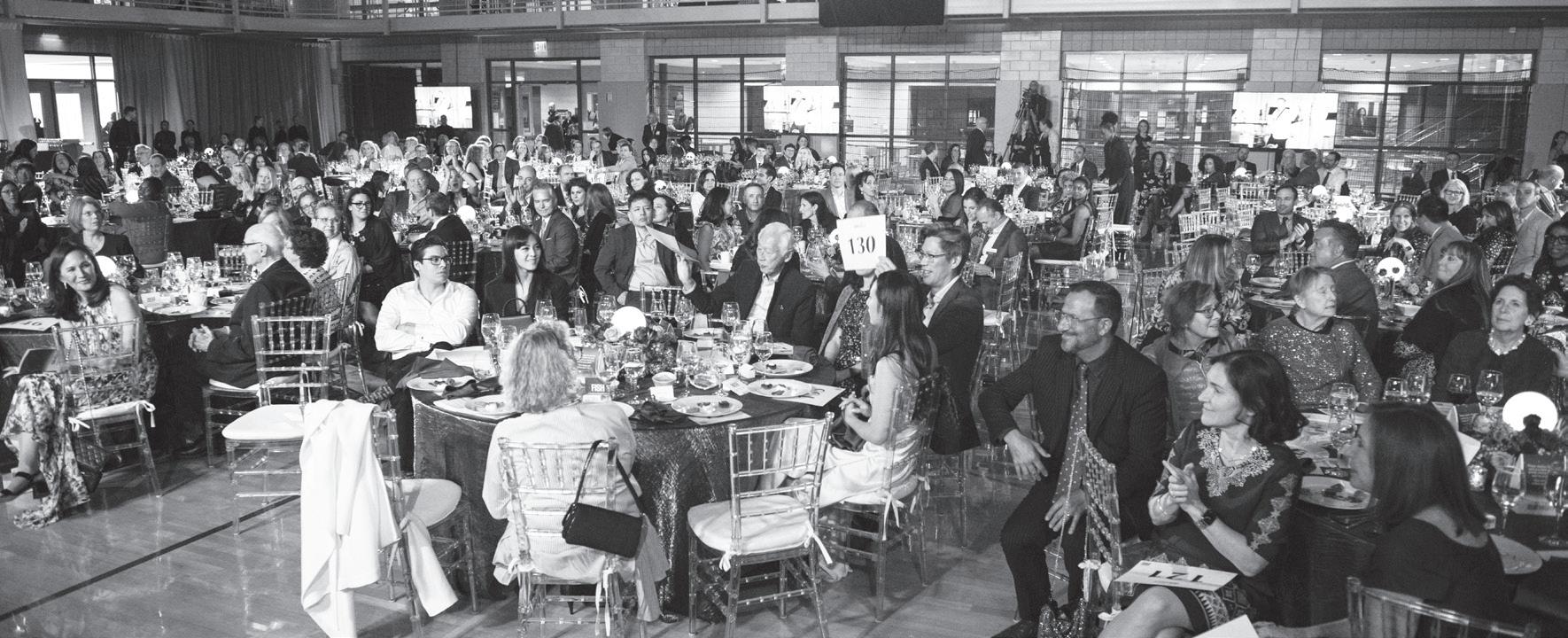
The donations will be used to invest in three areas of Masters to improve the Masters student experience: Facilities and campus enhancements ($68 million), current Programs and operations ($24 million), and
financial stability ($18.5 million).
Associate Head for Finance and Operations Andy Schenider spoke on the importance of having a strategic plan that determines where donations will go. He said, “If somebody’s going to write a really big check to the school, they have to believe that Ms. Danforth is somebody who can take that and use it toward something great to make the school a better place. So that’s why it’s so important to have a great head of school and somebody who’s visionary because it means that donors are really confident that if they are going to make a donation that it’s going to make the school stronger.”
The campaign has already paid for past advancement projects: the Ford, McCormack and Cole dorm updates (2018), the Strong and Thompson dorm renovations (2019), and the 21st century library
renovations in Masters Hall and the digital resource center (2020). Future projects using the campaign donations include the current construction of the Innovation and Entrepreneurship Center (IEC), Strayer Hall renovations, and building a bigger Claudia Boettcher Theatre.
According to Schneider, of the $90 million that was raised, $19 million has been contributed to the current $71 million endowment. “Some of this is pledged (i.e. “promised” by a donor but paid to the school over several years, so the cash has not yet all been received). Donors paying pledges over several years is common in capital campaigns,” Schneider said. He continued, “The $20 million that we don’t “spend” will be added to the school’s endowment, where it will be invested. The interest earned on those funds will be used to help bal-
ance our budget each year (as we discussed this morning, the larger the endowment, the less we need to rely on tuition to fund our day-to-day operations). But technically, the $20 million never gets “spent.” Only the accumulated interest on that $20 million gets spent,” Schneider said. Chair of the Board of Trustees, Edith Chapin is serving her 22nd year as a board member and sixth year as a Chair, and she will be stepping down this June. She said, “Community, that’s the essence of where we are. You have community on campus because we are a school, we are a campus and, you know, being able to solidify that for the future is how those three things fit together.We are a community and we need a place to be a community to convene and do what we do. And we want to ensure that that’s possible for the future so that’s how it all comes together.”
Anchors away! Carlson and Lemon get the ax
GiseLe cestaro
Lead News Editor
On Monday April 24, Tucker Carlson and Don Lemon, two major faces of the broadcast journalism industry, were fired from Fox News and CNN respectively. The news spread quickly, considering they worked at these major stations for several years. While Lemon has been open about his termination, Carlson has framed his severed ties from the network as a mutual decision. People are starting
to wonder if the events that transpired were a coincidence given the timing of the network announcements and the controversies both journalists faced.
Carlson has been widely known to be a Trump-supporting, right-winged journalist, who spreads a lot of information bias and often speaks about unsubstantiated conspiracy theories. Many conservatives followed him religiously, as he grew in popularity from the publicity Fox News provides. However, it seemed Carlson was

TUCKER CARLSON, DON LEMON represented two sides of the hot-air pundit war as reporters for Fox News and CNN, respectively. The termination of both figures from their roles in the public eye made waves in the journalistic community, and shocked viewers of the widely-watched television net works. The figureheads represent opposing perspectives of the cable news culture war, and their removals represent an important step to wards more productive civic discourse.
because after Dominion’s defamation lawsuit which accused Fox of knowingly airing false information about Dominion’s voting system became public knowledge and was settled for well over 700 million dollars in damages, the network immediately cut ties with Carlson. Evidence released in March, for example, showed text messages from Carlson that expressed his hatred for Trump, and how he can’t stand covering him in the media, which stands in stark contrast to his favorable coverage of Trump.
lot of viewers, which was helpful for his ratings, and the amount of money he was able to make, even as advertisers boycott it. The second reason is ideologicaleven if he didn’t like Trump personally, he could have agreed with his right-wing populist nativist politics, and so for that reason, it was an alliance of convenience.” Block maintained that it could be a combination of both rationales.
Some are thrilled that Carlson is finally being fired, as he has been known to spread a lot of hate. The Anti-Defamation League’s CEO, Jona-
has allegedly endured sexual harassment and open sexism for years.
Lemon, on the other hand, has become known for his misogynistic and toxic comments towards and about women. Last February, he was put in the hot seat when he said Nikki Haley, a Republican presidential candidate, “wasn’t in her prime.” He then proceeded to talk about when women are in their prime, which according to him, was in their 20s, 30s, and 40s.

Block was not astonished when he was informed of Lemon’s dis-
PODBEAN/CREATIVE COMMONS
reason for termination of employment, there is also speculation about whether financial difficulties are involved. According to Forbes, in 2023, cable viewership is at an all time low, with a shocking 34 percent decrease in year-long supporters. Because of this, the network had to do some rearranging, which mainly involved moving Lemon’s shows to the morning instead of his normal nights.
The big question for Carlson and Lemon is where they are headed next in the journalism world, and how cable news will be changed. “It’s so tempting to say that they will start up their own independent operations or they’ll join smaller companies, but they will never be as big as they were before,” Block said.
2 NEWS TOWER/ MAY 1, 2023
“
LiLy Zuckerman
Features Editor
SENEGALESE EXCHANGE STUDENTS ARRIVE at the airport. The Masters community has welcomed our visiting students with open arms, as they join classes, extracurriculars, and overall student life.
ROBERT FISH/TOWER
PARENTS, ALUMNI, AND TRUSTEES gathered at the gala to auction and bid on various items, including Taylor Swift tickets, dinner with Michael Douglas, and many more. Proceeds from the event will be going to the new “Our Might” initiative, which will seek to enhance the student experience through various improvements.
LYNDA SHENKMAN
GAGE SKIDMORE/FLICKR
Muslim community celebrates Ramadan
MAtthi A s JAylen Opinion Editor
Asmall community of Muslim students on The Masters School campus, along with millions around the world, have observed the Holy Month of Ramadan.

There was even a group of Senegalese exchange students that celebrated Ramadan on our campus. The sacred month of Ramadan occurs once a year on the 9th month of the Islamic calendar. Muslims observed the month to celebrate and remember when the Quran and the teachings of God were revealed to the Prophet Mohammed in 610 A.D. Muslims also celebrate to get closer and build a stronger connection to God. During Ramadan, Muslims fast during all daylight hours, pray, study the Quran, reflect, and donate to charity.
Sophomore and practicing Muslim, Hassan Saad, originally from Egypt, has been fasting each Ramadan since he first hit puberty at 10 years old. He started at 10 because according to Islamic law, that’s when God holds him accountable. Saad mentioned that Ramadan has affected him both academically and socially, yet he continues to devote himself to his religion and the month while studying abroad as a 7-day boarder.
Saad always keeps the purpose of Ramadan in mind, saying, “The purpose of Ramadan is to remember the poor in
your community and use it as a time of charity and give out to the people who don’t necessarily have food security.”
One difference Saad noted between observing Ramadan at Masters and in Egypt, was that back in his home country, there was a larger sense of community and awareness of the month, as there is a larger Muslim community compared to the very small Muslim community at Masters.
Saad said, “I don’t believe a lot of people [at Masters] know what Ramadan is, and I don’t blame anyone, I just think there isn’t enough of an Islamic community here, so I don’t think people understand what it is. I want to have more awareness about the Muslim community and Ramadan at school.”
Junior Sibora Sadrijaj, who is also observing Ramadan, shared similar sentiments as Saad. On top of both the physical and mental burden of fasting during the school day, she finds observing Ramadan most difficult at school. Though she’s extremely committed and devout to her religion, she feels ignored throughout the month at Masters.
Sadrijaj attributes feeling ignored to the small Muslim population at Masters. She said, “No one remembers its Ramadan or really cares because we don’t have a large community that participates in Ramadan. It’s easy to slip their minds, easy to forget, and easy to disregard it, but they don’t realize that the people in the Muslim community at Masters are
completely going through it alone.” She said outside of Masters, she feels a lot more supported. She said, “Anytime outside of school, I’m surrounded by a community of my family, cousins, and even just friends, that have a better knowledge of people that participate in Ramadan than people at Masters.”
Though fasting throughout the month has been tough for Sadrijaj, she feels like she’s learned and grown a lot spiritually. She said, “Spiritually, I’ve definitely learned to appreciate more, be a lot more grateful, and feel better about myself. When you finish fasting, you’re so grateful for the food you have.”
Even though both Saad and Sadrijaj feel like there isn’t enough awareness about Ramadan at Masters, the History and Religion department does teach about Islam and Ramadan in its course, Western Religions. Teaching all about Islam is a big part of that course’s curriculum. Taking either Eastern or Western Religions is a graduation requirement at the Masters School, about half of Masters graduates have taken Western Religions.
To commemorate the end of the holy month, on the evening of April 20, Muslims broke their fast for the last time of the year and celebrated Eid alFitr. Muslims in our community, Senegalese exchange students visiting The Masters School, and across the world commemorated Eid, by praying, eating and enjoying time with their loved ones.
Jenn Crandall visits Masters campus
aims to “complicate your ideas of identity,” Crandall said.
Jennifer Crandall, multimedia journalist, artist, and filmmaker, is visiting classes at Masters from April 24-28.
Crandall’s “Whitman, Alabama” is a multimedia portrait of the American South, in which each verse of Walt Whitman’s poem, “Song of Myself,” is read by disparate groups of Alabamians. The project draws from the filmmaker’s background as a “third culture” individual. It
She is attending English, art and journalism classes. Crandall and the Chair of Visual Arts, Cheryl Hajjar, hosted a salon during club time on April 26, in which students were invited to discuss, ask questions, and further learn about the bridges between creativity and identity.

Crandall shared her experiences in multimedia journalism and documentary filmmaking classes with students by discussing her creative process, and well as the challenges and rewards that come with asking questions
and meeting new people. According to Crandall, much of her inspiration behind “Whitman, Alabama” was her struggle with her own multicultural identity, and a deep connection to Whitman’s line, “Every atom belonging to me belongs to you.” This particular section resonated with her. “I just sort of grew up feeling we’re all connected in some way,” she said. Crandall said she has carried this idea with her since high school, and used it to drive her poetry-led documentary.
New IEC Facility Engineers Bridges of Opportunity
Contributing Writer
Customizing club merchandise, designing and executing dance uniforms with a computerized sewing machine and spray painting objects are just a few examples of projects Masters students will be able to create at the new IEC building. All-student access to high-tech gadgets will be available to students with the construction popping up on the former Evans Field where students once played softball.
The Innovation, Engineering
ment calls the bustling Cameron Mann Dining Hall its home – for now. This space limits what students can produce in IEC classes, as a main concern is the program’s spatial constraint.
Sophomore and engineering student, Rebecca Troy, elaborated, “Right now I feel like it’s [the IEC program] almost an afterthought. We have a couple of classes which are great, however, they’re not really a priority.”
Keeping in line with Masters’ mission statement, the IEC is in place to teach students how to be powers for good in the world. The new building has had a jump in construction over the past few months, and

According to the Director of Innovation, Engineering and Computer Science, John Chiodo, the gadgets will be available to all students and faculty, and are encouraged to be for interdisciplinary and inter-division use. Consequently, the machinery and makerspaces that serve as academic resources will be available to anybody excited to learn.
“I think there’s also an opportunity for people in any department to use something like 3D printing to their advantage. Like a history teacher could print a replica of a monument that they’re studying to show the class hands on, or a student who’s
advancement, Laura Danforth, Head of School, has made it a goal to provide the wider community with the same opportunity. Danforth explained that once the Masters team of students and faculty attain knowledge and proficiency with the novel construction, there is a target for an outreach program.
“I want to be able to find a way to invite students from the Bronx or Yonkers or Ossining. Somewhere where kids don’t have access to buildings like this and to programs like this to come in…where one Saturday morning a month, our IEC students are mentoring younger kids
building. I think that’s really important in helping them [underprivileged youth] be entrepreneurs.”
As the IEC program strives to educate the next generation of environmentally-conscious individuals, the construction itself is also “green.”
The Associate Head of School for Institutional Advancement, Seth Marx, said, “This building achieves a very high standard of carbon net zero. And that’s the broad combination of efficient systems, and connectivity to the green power grid.”
“Put simply, net zero means cutting greenhouse gas emissions to as close to zero as possi-
ble,” according to the United Nations, “with any remaining emissions re-absorbed from the atmosphere, by oceans and forests for instance.”
However, its bones aren’t the only attachment to nature that the building can boast. According to Marx, students can expect workspaces on the exterior, as well as an outdoor Harkness garden and bioretention center to recollect rainwater.
Marx said, “You as students can feel really proud of the way that your school has approached this because it will be beautiful, it will be innovative, and it will also be reflective, I think, of our values
TOWER/MAY 1, 2023 NEWS 3
PHOTO CREDIT CHANA KIM/TOWER
Allie FA ber
neenA Atkins, Allie FA ber
Contributing Writers
RYAN GUAN/TOWER
THE MONTH OF RAMADAN lasts from the evening of Wednesday, March 22 to the evening of Thursday, April 20. Though the Muslim community at Masters by no means represents a majority, many students have found community as they recognize Islamic teachings and forge a stronger connection with God.
CONSTRUCTION FOR THE NEW IEC is well underway. Seth Marx, the Associate Head of School for Institutional Advancement, and Laura Danforth, Head of School, affirm that the project should be completed and open to students by next fall. The school hopes the new IEC will fulfill the mission of being a “power for good” through climate-conscious construction and energy systems.
JENN CRANDALL, VISITING SCHOLAR, joined classes and engaged with students on campus throughout the week of April 24-28. On Wednesday, Apri 26th, Crandall hosted a seminar in the Art Studio where she raised the quintessential question: “What is an artist?”
JOSH MARKOWITZ/TOWER
SEE LONGER STORY ON CRANDALL’S VISIT ON MASTERSNY.ORG
NPR and PBS suspend their activity on Twitter following the designated labeling controversy
Viktoriia sokolenko Staff Writer
On April 12, NPR announced its decision to suspend its activity on Twitter. Currently, NPR has 8.8 million followers on Twitter and 52 official Twitter feeds, all of which stopped being updated. PBS, which has 2.2 million followers, and three other local public radio stations followed the lead and suspended their tweets. In a statement about activity suspension, NPR said, “We are not putting our journalism on platforms that have demonstrated an interest in undermining our credibility and the public’s understanding of our editorial independence.”
Their decisions came in response to Twitter’s labeling controversy when NPR’s account was tagged as “state-affiliated media.”
Such a label was traditionally used to designate the accounts of state-controlled media, criticized for their propagandistic purposes and lack of editorial independence, such as Russia Today in Russia or People’s Daily in China. Before that, BBC and NPR were exempt
from the “state-affiliated” label as “state-financed media organizations with editorial independence” which was explicitly stated in Twitter’s policy. After the situation received public attention, the mention of NPR was deleted from the most recent policy version.
At first, Twitter CEO Elon Musk supported the addition of the “state-affiliated” label, tweeting “Seems accurate” with a screenshot of the updated Twitter policy. However, after he exchanged emails with an NPR reporter and was sent the breakdown of NPR’s funding, he backed off his previous statement.
About a week after the backlash from NPR and other radio stations, Twitter changed the label on NPR’s account to “government-funded,” a newly-introduced label on the platform. Besides NPR and PBS, several other news outlets who receive government funding like BBC and Voice of America have received the same label. The labeling process, however, appears to be
As shootings
On February 13 a gunman opened fire in two buildings at Michigan State University, killing three students and critically injuring five others. The gunman was identified as a 43-year old man who was not affiliated with the university. While the shooting might have been far away for most of us in the Masters community, it was not for sophomore Rebecca Troy, whose older sister attends Michigan State University. She recalls being incredibly worried when she first heard the news and did not hear from her sister.
She said, “I know Michigan’s a large school but when somebody you love is in a situation like that, it kind of defies all rationality.”
This news made national headlines but it only took a few days for the story’s coverage to die down.
Gun violence and school shootings are a uniquely American epidemic. Over 100 mass shootings just this year have been reported according to The Gun Violence Archive and
last year there were around 600, nearly double the number reported in 2018. With this kind of growing frequency it’s not surprising that we have become numb, even our support for stricter gun laws has been dropping in the last 30 years according to polls by Gallup.
But Masters is not sheltered from the threat of gun violence. Last June, on a warm, sunny day during language finals, the community experienced a lockout, or more precisely, a “lock-in”. No one was allowed to leave the building after hearing that a threat was made to Days of Wonder, a daycare right down the street from Masters.
Gabriela Olay, a sophomore, was in the library when this all was taking place and recounts her initial reaction when she heard the chilling announcement over the loudspeaker. She said, “I immediately started crying, I was so terrified. I didn’t know what was going on.”
She described how students were climbing up into the small overhead compartments of bookshelves and how the once-calm atmosphere of the li-
inconsistent as similar media accounts were exempt from the description. Recently, however, all the labels were removed from the accounts of NPR, BBC, and other media outlets, including RT and Xinhua accounts, which had always been marked as state-affiliated. NPR as well as PBS and other public broadcasting stations do receive some funding from the Corporation for Public Broadcasting, an agency sponsored by the federal government. However, those funds constitute only one percent of MPR’s revenue.
About 40 percent of their revenue comes from sponsorships, and about 30 percent from the fees paid by local radio stations, who receive government funding for their operations’ expenses. Considering the inconsistency of labeling, both “state-affiliated” and “government-funded” descriptions were criticized as an attempt to undermine the credibility of arbitrarily-chosen public news organizations, call into question their editorial independence, and alienate their readership. The Committee to Protect Journalists in
response to the controversy tweeted, “It is imperative that Twitter revisit its decision to label NPR as ‘U.S. state-affiliated media.’ NPR receives public funding, but is not state-controlled, meaning Twitter’s listing could pose risks for journalists reporting from areas where suggestions of government affiliation have negative connotations.”

This scandal is not the first time Musk has gotten into conflict with news outlets. In December, he suspended the accounts of several journalists that reported on the account following his jet travels, which in Musk’s words gave “assassination coordinates.” After that, he started removing verification badges from several news organizations. One of them, the New York Times, refused to pay for the blue check, which had been assigned for free before.
NPR’s decision sets a precedent as it became the first major news organization to stop updating its account for an indefinite period of time. After Musk’s seeming conciliatory comments in an April 12 BBC interview, NPR CEO John Lansing said, “At this point I have
lost my faith in the decision-making at Twitter. I would need some time to understand whether Twitter can be trusted again.”
Upper School Spanish teacher Victoria Jansen is an active Twitter user who follows a variety of activists and writers and a few news sources. In response to Twitter’s arbitrary description policies and paid verification badges, Jansen said she is especially concerned for her students who are just learning how to validate sources since social media is one of the easiest ways for them to learn things.
“It’s terrifying, because, I mean, if you look at fascist dictatorships around the world and historically, one of the very first things that they do is dismantle faith in the media, in the news,” Jansen said. “A lot of people trusted Twitter to be a place that fact checked who was verified. And the fact that that’s no longer it, I feel that that really is going to allow very dangerous people to tell news in a way that’s not always true. And so NPR, being absent from that, that leaves kind of a vacuum: who’s going to push back on or provide news or articles that are critically thinking about how things are rolling out in our country.”

safety measures go up
brary was shattered by fear and panic.
“I just couldn’t even imagine that it could have been happening in real life.”
When students learned the threat was over, life went back to nor-
mal for everyone except for Victor Seguinot, head of security. As a former New York City policeman, ensuring the safety of those around him has always been at the forefront of his mind. Seguinot reported that there
Number Of Mass Shootings In The U.S. Per Year
MASS SHOOTINGS SIGNIFICANTLY INCREASED in the past several years. Compared to 2015-2018, 2021 and 2022 have seen increases of around 300 shootings per year, a near doubling from a numbers already horrifically high. Data gathered from Everytown For Gun Safety, a group advocating for further gun control.

have been many updates to school security in the last decade at Masters. 12-14 years ago, he said, there were only five security guards at Masters and now that number is up to 21. He also noted that when he first arrived at the school, there were 63 surveillance cameras and now they are up to 95. The new IEC building is also expected to add 20 more cameras on campus. For Seguinot, keeping all of us safe on campus is not just his job, considering he is also a parent of a Masters student. He knows firsthand the worries of sending one’s child
off to school. “It’s not easy for your parents or for your loved ones. When they send you to school, they expect you to come back,” he said. For all of the improvements in campus security, Seguinot acknowledges that the epidemic of shootings requires a multi-pronged approach. He believes that the issue is rooted in the lack of attention paid to mental health care in the country. He proudly points out that Masters is ahead of the curve on this and has steadily increased the number of guidance counselors at the school as the frequency of shootings has become more prevalent.
With a mass shooting happening at a rate of more than one a day this year, they are hard to escape mentally. Troy, who was on campus during the lockout and has now experienced the fear of a loved one being at an actual school shooting, knows both sides of the terror and has come to accept it as our new reality.
“So although it’s really upsetting that this has become part of a normal routine, I think I have accepted that there’s always a chance, albeit a small chance, that something like this could occur in my own life,” Troy said.
Congress raises concerns about TikTok
tol Hill, Chew realized that most of the government’s concern was based on speculation, and that there was no real evidence presented to make a solid case for a ban.
On March 23, Shou Zi Chew, CEO of the popular app TikTok, sat before Congress to impart reasoning on why the app is not a threat to the privacy of Americans. Despite five hours of back and forth from committee members and Chew answering all questions, the members of Congress could not be swayed from their original opinion: TikTok is just a facade for the Chinese government’s intentions of spying on Americans.
Hearing that TikTok could potentially be banned isn’t news, as users in the past have fallen into a crisis believing that under the Trump administration, their app would be stripped away. Those with a large following bid farewell to their supporters, and encouraged them to keep the income flowing and likes piling through other social media apps. However, people, mainly influencers, were presently surprised when the day of impending doom never came.
What once was just talk and rumors transitioned into a real movement for the government to ban the app for good. At the Congressional meeting on Capi -
Congress is worried that TikTok is collecting data from over 150 million U.S. users and is appointing the app as a national security risk. Chew tried to assuage the lawmakers concerns by pointing
lieves TikTok should be banned because he believes that a lot of major companies are taking personal information from and selling it to advertisers. “It’s a security breach, especially for a Chinese company. With them being the global superpower they are right now, it’s a threat,” he said.
A democratic representative from Delaware named Lisa Blunt
collecting data from young people. According to The New York Times she said, “I think that really summarizes why you see so much bipartisan consensus and concerns about your company, and I imagine that’s not going away anytime soon.”
The concerns of the people are not only reliant on privacy, but the spread of misinformation, addiction, and young exposure.
Ana Castillo, one of the Mental Health at Masters co-chairs, had TikTok for several months before she deemed it unhealthy and deleted the platform.
out that data will be stored in the U.S and not able to be accessed by the Chinese government, but they didn’t buy what he was telling them. Jake Mason, a junior, be -
Rochester said that lawmakers were hoping to have some of their concerns alleviated after the congressional meeting. Rochester was also concerned that the company was
“I was seeing the constant spread of misinformation from what I knew wasn’t an accurate source. I also would see similar videos pop up on my page to the ones I liked, which is when I knew the algorithm was more intense than other apps,” she said. Although she thinks TikTok should be banned because of its unhealthy effects, she doesn’t see it as a national security issue. “I think calling it a privacy risk is a stretch, considering they don’t have any evidence,” Castillo said.
POSSIBLE TIKTOK BANS HAVE begun to be discussed earnestly in the halls of Congress. A tense committee hearing featuring the CEO of TikTok saw him get grilled by highly skeptical congresspeople across the party lines. A vast majority of lawmakers are open to banning Tiktok, which has already been banned from the devices of certain governmnent officials and civil servants, as well as banned in its entirety in the state of Montana.
4 NEWS TOWER/MAY 1, 2023 SYDNEY STARKEY/TOWER
-
NPR
“
We are not putting our journalism on platforms that have demonstrated an interest in undermining our credibility and the public’s understanding of our editorial independence.”
increase,
Gisele Cestaro
Lead News Editor
sydney starkey Tower Illustrator
JOSH MARKOWITZ/TOWER
I was seeing the constant spread of misinformation from what I knew wasn’t an accurate source. I also would see similar videos pop up on my page to the ones I liked, which is when I knew the algorithm was more intense than other apps,”
“
- Ana Castillo, ‘23
OpiniOn
EDITORIAL
Are we aware of our academic privilege?
Matilda:
Education by many, is deemed a privilege, and one that does not come cheap.
From work to time to money the cost of getting a good education is increasing year by year.
Today, May 1, marks the first day of Advanced Placement (AP) exams, which are often considered stepping stones in the college application process. As the road to seeking a higher education begins for some, it is ending for others. Today is also the final university commitment day for the class of 2023. They are on the brink of crossing the finish line for their high school journey, and approaching a new starting point.
However, today, we want to focus on the in-between: college progress. Although the commitment posts on Instagram or the ring of a bell might mark the result, the journey there might vastly vary depending on each person. And as students at Masters, we want to ex -
amine the privilege we have, and those that are built into the system which might benefit some who are reading this, while others struggle under the same conditions.
From one-on-one attention by our AP teachers, to the possibility of SAT prep, to the availability of college counselors there to help you navigate the journey, we are given many resources at Masters which others whose applications are competing with ours are not.
After the pandemic, this privilege we gain by attending this school may have become more significant. In the hopes of decreasing inequalities posed by accessibility to standardized testing, universities have begun to move away from AP, SAT (Scholastic Assessment Test) and ACT (American College Testing) exams. However, we might also wonder, will this make the college process more reliant on GPA’s (Grade Point Average), or place more weight on extracurric -
ular activities many do not have the time or money to afford? Will the internships your parents can get you give you even more of an advantage than it did before?
That leads to the question: Are we aware enough of our privilege? The preponderance of educational resources we are given can be considered extremely advantageous compared to those outside our blanket wrapped social interactions. As we step into the weeks of exams, into the college process or onto a new school, let us maintain sensitivity towards our own privilege and view it in the perspective of those around us. As students ourselves we understand the pressures of leaving a setting that has given us comfort throughout one of the biggest transitions of adolescence. Creating such an open community allows us to turn towards one another for support and guidance.
TikTok is stealing your time, not your information
lily Zuckerm An Features Editor
Ihave to admit that I am guilty of getting sucked into the world of TikTok, but who isn’t these days? To be honest, whenever I open my phone, no matter
ing into the algorithm, watching random people do random things. Nonetheless, I can also get distracted by many other things: my dog, my email inbox, music, and many other factors.
According to the newsroom of TikTok, there were
States of America’s population is 331,449,281. That means that nearly half of the United States population uses TikTok.
Congressman Bowman sees attacks on TikTok stemming from xenophobia
Despite the platform’s popularity, the United States Senate launched a bipartisan bill on March 7 that would authorize President Joe Biden to legally ban and regulate foreign made technology, including TikTok.
Known as the RESTRICT Act, an acronym for Restricting the Emergence of Security Threats that Risk Information and Communications Technology, the bill is aimed to shield citizens from foreign technology that presents a national security hazard.
LILY ZUCKERMAN ARGUES THAT it’s unfair for TikTok to be targeted while other social media platforms are alive and well. Both Zuckerman and Congressman Bowman label this xenophobia
the motive (e.g texting my mom or checking the time), I always find myself opening TikTok. I end up just scroll-
2022-2023
editors-in-chieF MaIa BaRantsEvItCh EllIE yang
Marketing director CaRlos hEREdIa
news lead editor gIsElE CEstaRo
news editors olIvER KREEgER alExa MuRPhy
oPinion lead editor Maya PhIllIPs
oPinion editor MatthIas JaylEn
Features lead editors MaRIanna gu luCas sEguInot
Features editors taRa PhIllIPs lIly zuCKERMan
sPorts lead editor noah KassEll-yung
sPorts editor adaM BEllo
social Media Managers lydIa EttIngER sandRa lIu
weB editor xavIER Rolston
staFF writer vIKtoRIIa soKolEnKo
over 150 million active users in the United States in 2020.
According to the last U.S. Census in 2020, the United
Given the recent past, when some Americans referred to the global disease COVID-19 as the “Wuhan Virus” or “Chinese Virus,” blaming China for the creation of the disease, banning TikTok feels like another act of xenophobia against the Chinese.
Congressman Jamaal Bowman of the 16th district of New York, which includes the Northern Bronx and parts of Westchester County, continues to be a strong advocate for TikTok in congressional hear-
ings. In an exclusive interview with Tower, he defended the platform. He said, “It’s less about the app and more about the marginalization of TikTok. We need to have a larger conversation about the overall harms and safety insecurities issues that are associated with social media, as opposed to just targeting TikTok.” As a matter of fact, Bowman is a TikTok user himself. He can be found at “@ repbowman” - with 204.2 thousand followers. He sees TikTok as a valuable way for citizens to exercise their rights to free speech. “If you take that away [TikTok], you take away a space where all of us found our voices and you’re taking away our freedom of speech and communicating on Tik Tok is very different than communicating on the other social media platforms,” Bowman said.
Bowman believes that the criticism of TikTok stems largely from anti-Chinese bias. “Our country was built on hate, evil, racism and dis-
crimination. It was founded with slavery of Africans still intact. “Unfortunately, bias, discrimination and hate are a part of America’s DNA. It’s something that we have to exorcize out of our system in order for us to really be a great country for everyone,” Bowman said. He continued, “Right now, they [American politicians] are using a lot of fear-mongering to govern, and they’re always talking about all of the bad things that China is doing,” Bowman said. Among the 150 million TikTok users in the U.S., there are Masters students that use the app to get brand partnerships, create content, discover music, and get clothing recommendations. Since first posting her dancing on TikTok in December of 2021, sophomore Leah Thomas has amassed 48.9k followers and 1.3 million likes on the platform; she can be found “@leahhjanaeofficial.” Thomas has worked with numerous brands to post about items that she gets for free as a brand ambassador. Thomas has discovered the business side of content creation since going viral. She said,“Honestly, I just post during the day because it grows my audience. I feel like if you post a lot you have a higher chance of people coming across
your account and growing your follower count. The more you post, the more attention you gain [from accounts], the more opportunities you get.”
If Thomas had not gone viral on TikTok, she would not have known that she was interested in pursuing a career in business. “I’ve learned how to promote my account and grow my following count. For example, I have learned techniques in reaching out to brands for partnerships,” Thomas said. Thomas has been sent free clothes from brands and gets to keep them if she makes a haul showing what she received. Thomas exhibits how TikTok can be beneficial for users. She is sixteen and has already learned life long lessons.
The potential banning of TikTok is just another example of the deeply-rooted racism in our country. There’s no doubt that TikTok has been firmly integrated into our society and culture; but that’s more of a reason for it to not be banned. There are better ways to protect your personal data and attention span, but the answer should not be as drastic as banning one social media platform because it is foreign. Instead, there should be laws that apply to all social media platforms in the intent of improving national security.


A.I. is a tool to achieve academic excellence

 AdAm Bello Sports Editor
AdAm Bello Sports Editor
New Artifical Inteligence (AI) technology, ChatGPT, has become increasingly popular in the last few months being used by people across the globe for everything from helping write emails, to creating recipes in the matter of seconds. The AI was created by the company OpenAI and launched in November of 2022 as a processing tool that is programmed to assist people with various tasks at a high speed. Though proven to be very helpful to many, schools are concerned about student use of the new technology in the classroom.
Schools all around the country and all over the world are prohibiting their students from using ChatGPT all together, as they think students are using it in order to cheat on their assignments, write essays, and commit academic
dishonesty. In early January 2023, New York City Public schools banned all students from using Chat GPT for school work due to worries about cheating and not giving students the ability to “build critical-thinking and problem-solving skills,” deputy press secretary of the NYC Department of Education, Jenna Lyle said. Though some students have been using it in order to cheat, ChatGPT is a good resource for students and shouldn’t be completely banned from schools.
Junior Lucas Petrini said, “ChatGPT has been a great resource for me in the classroom. I use it to help gain a better understanding of chapters in a book for English or learn more about someone I’m doing research on in history. I think it can be extremely valuable if used correctly.”
ChatGPT is a great tool for helping students create citations on papers, check writing for grammatical is -
sues, and locate quotes in a large body of text.
Students who choose to use ChatGPT to write their essays may find it hurts them more than it helps. It often does not convey the writer’s voice, the way an author’s personality is expressed in their writing.
The AI also does not convey feeling or emotion well in writing, forcing students to have to rewrite the essays anyway.
Petrini also said, “I have never used it to try and write an essay for a class but I don’t recommend it. My friend from another school got a bad grade on the essay he submitted from ChatGPT even though he didn’t get caught.”
AI has also proven to increase work productivity not only in the classroom, but also in the workplace.
Customer service workers at a Fortune 500 software company who were given access to AI software were 14% more productive than
those who were not. Technology is constantly changing and evolving and if students are stopped fromusing them, they are being denied
valuable resources that have proven helpful. In a survey conducted by USA Today in February, 73% of teachers said that ChatGPT “can help
students learn more in the classroom,”but yet school administrations are banning the program from schools.
Photo editor Josh MaRKowItz
advertising & distriBution Manager JustInE PasCuttI
lead coPy editor auRoRa RosE hoRn coPy editor avIv EMERy accountaBility and Media advanceMent Manager RooKE wIsER
executive Producer, tower Broadcast news CaRol QuEIRoz hanna sChICIano
contriButing writers ChanEl nEal ElIzaBEth sKREnta EllIE hIsE ayalah sPRatt allIE FaBER nEEna atKIns sydnEy staRKEy
staFF PhotograPhers and illustrators Chana KIM alyssa wang Ryan guan lIsa yao IssaC Cass
Faculty advisers
online MeDia
For more information, follow Tower on the following platforms:
Website: Tower.MastersNY.org
Facebook: MastersTower Twitter: @MastersTower Instagram: @MastersTower
EllEn CowhEy Matt IvEs Distribution Process Tower is hand-delivered on the day of publication to the Upper School. 650 copies are printed. A copy is sent to each of our advertisers.
scholastic Press affiliations, letters anD eDitorial Policy Tower is the winner of the Pacemaker Award for Overall Excellence, an award-winning member of the National Scholastic Press Association (NSPA), Columbia Scholastic Press Association (CSPA), Journalism Education Association (JEA) and Quill and Scroll. We encourage Letters to the Editor, which can be submitted to the following email address: TowerEditors@MastersNY.org. Published approximately five times a year, Tower, the student newspaper of The Masters School, is a public forum, with its Editorial Board making all decisions concerning content. Commentaries and opinion columns are the expressed opinion of the author and not of Tower and its Editorial Board or its advisers. Furthermore, the opinions conveyed are not those of The Masters School, faculty, or staff. Unsigned editorials express views of the majority of the Editorial Board.
5 OP-ED TOWER/MAY 1, 2023
TOWER
ADAM BELLO ARGUES THAT A.I. should be used as a tool in schools all over the nation for students to be able to achieve academic excellence. MIKE MACKENZIE/FLICKR
CARLOS HEREDIA/TOWER
I want to go to school.
Mr. Wormwood: School? It’s out of the question. Who would be here to sign for the packages? We can’t leave valuable packages sitting out on the doorstep. Now go watch TV like a good kid.
Civics education, a failure we need to fix
ccording to multiple surveys, the American public broadly “fail” civic literacy, or the understanding of how laws and government work in the United States at a fundamental level. As a school and community, we have the ability and responsibility to help address the widespread civic illiteracy.
We already touch on some crucial aspects of civics, mainly in history classes, though at the moment there aren’t any courses fully and explicitly dedicated to helping people get a full understanding of governmental practices except for political science, a course limited to seniors.
Many people are aware of America’s abysmal voter turnout numbersoften only half of adults or less will vote in elections - and eligible voters 18-24 years old are often the age range among all voters with the lowest turnout rate.

Thankfully, as mentioned before, there are opportunities to learn about civics mandated in existing history curricula. All junior-year courses in American history, from US History to AP US History (APUSH) to American Studies, have aspects of their syllabi specifically teaching and exploring the formation and structure of the U.S. government. The prevalent issue still remains - many young people find themselves really disengaged from civics. Why is it that American youth as a whole can still find ourselves somewhat disengaged from civics as a whole? How does this relate to our understanding of the American legal system?
Jodie Goldberg, a Middle and Upper School Health teacher, has many meaningful experiences from a law class she took in high school. In her law class, Goldberg’s teacher assigned them a mock legal case, and every student took a role in the trial, with Goldberg choosing to be one of the lawyers. “It was really cool. Actu-
ally, it’s one of the moments from high school that I can vividly remember…I remember objecting, I remember the actual moments of exactly where I was,” Goldberg said.
The project-based learning in that class offered benefits to learning in a way that could also prove useful for Masters to note. Goldberg recalls many details about her law final project years later, in a way not always found in assessment-focused curricula focused on more rote memorization.
more fundamental skill-building Furthermore, Goldberg believes that a law class or a general Civics course offering would be very beneficial for Masters.
I definitely work towards adding to our curriculum the realities of the health care system in our country, and especially right now, with all the laws and bills that are being proposed and passed.
In addition to direct knowledge about topics such as the functioning of the American government, this hits to yet another beneficial potential of classes covering civics and/or law -
“I think one of the most incredible things about Masters students is that they care a lot about what’s going on in the world.” Goldberg said, “And I think the more information we can give our students who have voices and can use them and be a power for good, the better. The best way we can do that is to fill them up with even more knowledge about how our country works. And so I think [a civics class] would just supplement all the work that Masters students are
already doing.” Goldberg says all of these things not just as an educator who happened to take a class focused on American law in high school, but also in her capacity as a Health and Wellness teacher.
“I definitely work towards adding to our curriculum the realities of the health care system in our country, and especially right now, with all the laws and bills that are
The Trump - DeSantis Dilemna
carlos heredia Marketing Director
Though it’s still unclear whether Ron DeSantis will run for president, it’s fair to say he poses the only credible challenge to Donald Trump.
Although he faced heavy criticism from the media for his opposition to lockdowns and vaccine mandates, his stance on COVID-19 was ultimately vindicated, with a death rate in Florida within the national average. The state has seen above-average economic growth, has become a leader in population growth, and generated the largest budget surplus in its history. His involvement in cultural battles, particularly over education, has garnered large support from conservatives across the country. He won re-election in a historic landslide, winning the Latino vote and flipping Democratic strongholds – four years after having won by just 0.4% of the vote.
He’s one of the few governors to effectively operate a state with a Republican legislature and has been ahead of the curve with coronavirus policy, governance, and cultural issues (sometimes even ahead of Trump). DeSantis is willing to achieve results without compromising his principles or pandering to those who act in bad faith. He’s willing to push through legislation with the same level of determination that Democrats have displayed every single time they’ve gained even a modicum of power, even when it goes against his own state legislature. His firm stance on redistricting provided a
critical lifeline for House Republicans in 2022, who ended up badly underperforming expectations nationally.
One of Trump’s biggest strengths - and weaknesses - is his personality. Trump can easily lose focus, get caught up in unimportant details, and be petty. There’s times where he expresses valid, true, or even popular ideas that end up getting lost in his wording. But that loudness and volatility was an important aspect in his rise to power. It can rile up support or bring attention to issues, and it’s been a major part of his appeal. DeSantis doesn’t really carry that sort of energy.
In an article about new elected Ohio Senator J.D. Vance, Daniel McCarthy writes, “The fire was in the language, not in the man. Sincerity isn’t enough to sell a political agenda, especially if it’s a hard-edged one. You need the right persona to go with it. What Aristotle identified as pathos, the emotion of a speech, has to be matched by the ethos, the character type, of the rhetorician. A speech that sounds right coming from an old man sounds mawkish or absurd from a young one, for example.”
This idea applies equally to DeSantis. The lack of that believable “fire” is probably one of the biggest reasons so many people distrust or are hesitant about him, even if there’s something respectable about being a grumpy politician who’s just there to do his job and go home. It’s unclear whether that contrast in attitude made a difference in winning areas like Miami-Dade County, which had already trended Republican in 2020,
or if it was mainly policy that continued or accelerated that trend.
Trump has always been a bit of a mess. In terms of potential for accomplishments he likely has a lower floor than DeSantis, but also a much higher ceiling. Despite having repeatedly switched par -
ties and being in the public spotlight for decades his attitudes on economic and foreign policy have remained relatively unchanged. He’s one of the few politicians who, at the core of it, actually gets it. And it’s probably not only the right set of policies for the GOP,
but necessary if it hopes to maintain relevance: going down the George Bush route isn’t much of an option. Even as a rich man, Trump’s wealth hasn’t kept him from following the soft-handed approach many of the more elite Republicans of the past have taken. His disagreeableness has kept him from falling into the trap of a party mold: he’s not some ideologue like many of these super religious types(e.g. Mike Pence) or one of those economic nerdy types (e.g. Paul Ryan), and so you’re not going to see him push for abortion bans or Social Security cuts either. And sure, sometimes that also means he gets distracted from the things that matter: whether it’s 2020 nonsense getting in the way of 2022, or his ego getting in the way of a good endorsement, or a petty fight that takes up his time. But when he’s not distracted, when he’s animated the way he was in 2016, and focuses on actual issues – getting rid of ineffective Republicans, calling for actual specific policies, delivering a memorable message – he’s able to turn out a lot of people who don’t usually vote or care about politics.
Though a loss is still a loss, those 2020 results were not far off from taking the House, holding the Senate, and maintaining the presidency. And that was under some of the worst conditions for a president imaginable: COVID-19, the blatantly partisan media coverage of his presidency, being massively outspent during his campaign, etc. 2020 was by no means a repudiation of Trump. But whether or not he can get past that finish line
being proposed and passed,” Goldberg said, “understanding how that happens, understanding what our rights are, understanding how to go about getting access to services, knowing where you can, where you can’t. I think all of that relates back to service. I think we have to know. I think it would be awesome and a great way to supplement the material that we’re talking about.”
the next time still has no clear answer. Perhaps the hopes of Trump living up to his political potential is setting a high or unrealistic bar to reach, but he’s currently the only person capable of reaching that high. One of the useful things about a potential DeSantis challenge is that it actually has moved Trump more toward that direction. His campaign has already issued several videos detailing policy plans on varying issues, and he’s begun taking a more forward-looking approach to his campaign. DeSantis is an excellent governor, but it’s not fully obvious how he’d deal with the Republican establishment who’ve repeatedly gotten in the way of Trump reaching for that bar. And it doesn’t earn much trust from primary voters when they see these figures openly encouraging him to run, either. Unlike most of the other primary candidates, I actually like both Trump and DeSantis, and I’d happily vote for either of them in a general election. But a DeSantis campaign only works if he brands himself as someone who’s appreciative of Trump and sees himself as better suited to continue the work he’s done. If Republican voters believe that Trump’s risks outweigh his potential, or if his potential is less than what was previously thought, he loses. But as of right now, Trump still carries a lot of hope with him, and it’s why, despite all the baggage, he’s not done yet.

The AI revolution is here. Will it really“destroy” humanity?
eugene hwang Columnist
If you were about to get on a plane, and 50% of the engineers who built the plane said there is a 10% chance of it crashing, would you get on it? Artificial Intelligence is the fastest-evolving paradigm shift in human history. The fastest ever. And this fact tends to frighten people. According to the recent MITRE-Harris poll survey on AI trends, 78% of Americans do not trust the development of AI technologies. The radical opponents of AI deployment fear that AI will be weaponized against the general public, creating mass disruption. These beliefs are not completely unfounded. In a much-cited survey in 2022, AI experts were asked about the likelihood of human extinction due to AI. 50% responded that there was a 10% or greater chance that humans would go extinct from our inability to control AI. Are we ready to take that risk?
This current global dialogue on the safety of AI technology seems to harken back to Stephen Hawking’s prediction in 2014 that, “The development of full artificial intelligence could spell the end of the human race…” Ironically, Stephen Hawking himself relied quite heavily on AI in his daily life, but couldn’t resist being pessimistic about the technology’s future.

Besides the existential threat,
AI skepticism is being driven by the question, “Who benefits from all this?” There is a growing public distrust against tech giants, especially after Elon Musk took over Twitter (and did some crazy things). One comment from a New York Times post that was too funny not to share reads: “Yes, the planet got destroyed. But for a beautiful moment
to make money. They try to startle you and knock you off your feet so that you think they are building some “magical thing” that nobody understands how they did it.
But I am here to tell you – don’t be fooled by the tech companies. If you dissect the AI revolution closely you will soon find that much of this is strategically-planned marketing.
later, the same model is still being used for our newest chatbots, suggesting that there hasn’t been much of a real breakthrough for AI in the language domain. The newest AI models are impressive because of the sheer amount of data they use, and the performances are only now exponentially improving because tech companies are pouring much more money into it. Once they run out of money or data, this AI revolution will slow down, so it is unlikely that we will have sentient AI in 5 years – at least not by feeding the same model infinitely more data.
in the next decade, seems very farfetched. We’re only in the early stages of this technology, and GPT-4 is still nowhere near the level of AGI. For an AI to become “sentient”, it should be able to incorporate not merely text but all aspects of the “human experience”, including vision, touch, social awareness, and even emotion. In addition, there are still a million problems that
need to be solved for AGI to happen, such as algorithmic bias, hallucinations, and domain specificity. So instead of worrying that AI will destroy the world, we should ask ourselves, how will AI be kept equitable and be used for the good of humanity? Remember: catastrophic thinking won’t get us where, but constructive thinking will.
in time, we created a lot of value for shareholders.” This perfectly illustrates both the irrational sense of anxiety we feel towards AI and our skepticism for those who control it.
Part of this fear stems from the sheer speed at which AI is improving. But a larger part of this fear is caused by the publicity stunts of these tech companies. If you’re someone who’s never really followed AI and all of a sudden discovered ChatGPT’s unreal capabilities, it might certainly shock you –even scare you. However, the truth is, this is what tech companies do
From a technical standpoint, the release of ChatGPT is not really a “groundbreaking breakthrough”, though it could certainly be one from a social viewpoint. In 2017, Google introduced what I believe to be one of the most influential papers in the field of AI: “Transformers”. Yes, it is the transformer that made possible the GPT (Generative Pre-trained Transformers). The Transformer changed the fate of language models forever – its design was much simpler than its predecessors, but somehow managed to outperform them in all aspects. Seven years
There is no doubt we’re living through the AI revolution, but much of that hype is inflated by tech companies that make it seem like their newest release is some kind of technological breakthrough when it’s really just a desperate attempt by tech giants to beat out their competitors by “spending more money” than them. However, increasing data size exponentially is not a sustainable method for AI growth after all, and there is only so much obtainable data on the internet. Soon, we will see that much of this AI hype was generated by the tech sectors blindly jumping in on the AI War thinking that infinitely increasing data size will solve everything, instead of focusing on the fundamentals: the algorithm itself.
In the end, the idea that an Artificial General Intelligence (AGI) – an AI that can do everything that a human brain can do – will emerge
6 OP-ED TOWER/MAY1 2023
CHANA KIM/TOWER
THE BODLEIAN LIBRARIES/ WIKICOMMONS EUGENE HWANG ARGUES THAT though Stephen Hawking preditcted that A.I. is dangerous, no catasrophe will come from it. He also believes that humans should be optimistic about A.I.
Aoliver kreeger News Editor GPA PHOTO ARCHIVES/FLICKR
OLIVER KREEGER DEMANDS THAT Masters should teach more civic classes as it’s crucial to learn how to be a citizen in this country.
“
-Jodie Goldberg, Health Teacher
The development of full artificial intelligence could spell the end of the human race.”
“
-Stephen Hawking
Though choosing a candidate may be difficult, both DeSantis and Trump come with very a positive upside according to Heredia.
Why final exams should be history
 Aviv EmEry Copy Editor
Aviv EmEry Copy Editor
Finals. Every year, from June 5th to 9th, Masters high school students stagger in from the sunny outdoors into the air-conditioned Fonseca Centet gym, sit down in uncomfortable squeaky chairs, get barked orders by their proctors and take a ninety minute long test which decides 20%-80% of their final grade in most of their given classes. Students spend the next few hours shaking their legs, tapping their pencils on the desks and maybe even running out of the room, crying. But, finally it’s over… until it’s not.
Most underclassmen, and some upperclassman students repeat this testing process the next day, and the next, and the next, until summer officially comes at the end of the week, and school is finally out for the year
Although, a lot of juniors and se -
weeks, or week, if you’re a procrastinator like me, leading up to finals, just to forget everything studied as soon as the finals are over.
Ella Horowitz ‘26 said, “One of the stresses is using your time on tests correctly… time management skills. With projects, you have more time and more of the ability to showcase all of your skills.”
To make matters worse, at Masters, we only have one week of official review, which for me, and I’m sure many others, is so little time to go over every single thing we’ve learned throughout our school year; Since Masters also doesn’t do midterms, we have to remember a year’s worth of material, rather than just a semester’s worth. And when some students have also spent the entirety of April and May preparing for AP exams or doing their AmSearches and finally, even after all that, students are still learning new material in their math classes two weeks before finals begins, it’s just neverending
Finals inaccurately tell my teachers what I took from their class, and ultimately reflect poorly on me as a student. Even after all the reasons I’ve listed, there are still so many more that tell us why final tests just aren’t the right way to see if students have learned anything throughout the year, not to mention that teachers probably don’t really want to spend the week after summer starts maniacally grading final papers to get grades on time anyways. So what’s the solution I’d of -
fer? Many students would much rather do a final essay, presentation, or project in any of their classes than take a final test.
Zara Suvanto ‘24 spoke on this, saying, “Personally, I’m not a good test taker, and with a final project, I get to go home and think about it without any pressure. Tests just really stress me out, especially with my dyslexia.”
Studies show that final projects help enhance problem solving, management, and creative thinking skills. Not to mention that the lack
of stress will actually make students more likely to perform better on final projects and papers.
They’re generally more appealing to students, and teachers and students alike have a lot more range and creativity which they can use when it comes to final projects. In ninth grade Spanish, we had to cook a dish from a Spanish speaking country. Not only was this fun for me, the teacher was also able to see me apply my skills in a real world way. In my opinion, that’s much more valuable than answering some
grammar questions. Horowitz agrees, saying, “Final projects show more of your strengths than a test, it shows your ability to research topics and write about differ things that you might not be able to express on a test.’ For some classes, such as math or science, a final project is much harder to achieve, since they’re already built in test based curriculums. But in classes like history or language, a final project, or oral test may even be a better way than a final to demonstrate a students’ abilities.
niors take either no finals, or very few.
But, for many other students, including myself, finals, and the weeks leading up to them come with significant anxiety, loss of motivation and worst of all, overwhelming and spirit-crushing stress.
Finals are, for many students and for many reasons, a terrible way to demonstrate what’s been learned throughout the years. Finals often leave students no time to retain what we’ve learned throughout the year, students cram studying during the
stress.
Test anxiety is another factor; for some students, anxiety prevents them from performing well on their final exams. For me, no matter how much I study and prepare, be it two hours or 12 hours, it’s possible I could get up to that desk, and forget everything I studied: my mind just goes completely blank. Finals, especially for students like me, who just can’t take tests, finals are a terrible way of showing the material that they’ve learned throughout the year.
AVIV EMERY ARGUES THAT instead of final tests, the Upper School should move into Final projects and essays as a better way to demonstrate what a student has learned throughout the school year. Final projects better demonstrate a student’s teamwork, work ethic, and creative thinking skills. Students that have test anxiety and performance iissues will benefit from this change.
How diverse is your AP class?
Equity gaps in advanced classes remain prominent in the U.S.
viktorii A SokolEnko Staff Writer
In the US black students make up 15% of high schoolers in the US, yet only 9% of students enrolled in at least one AP course. Similarly, 25% of high schoolers are Latinx, but they make up only 21% of students enrolled in AP courses. Even among the schools that are racially diverse and offer an array of advanced courses, Black, Latinx, and Indigenous students are underrepresented in AP classes. From the teacher and assessment biases to funding gaps to non-inclusive requirements and curriculums, many factors make it much harder for Black, Latinx, or Indigenous students to enroll in, take, and then pass an AP class BENEFIT OF AP
CLASSES:
Despite various limitations of the AP curriculum and its focus on final exams, many students choose to take AP courses as a way to boost their college applications and show their academic abilities. Moreover, AP students get to challenge themselves and prepare for the more rigorous college classes.

If one’s university recognizes college credits earned in high school, AP courses make it easier for students to take more advanced classes in college, double-major and graduate earlier. With enough AP classes taken during a high school career, one might save money on tuition for at least one semester of college, considerably lifting the financial burden off their families.
LACK OF AP OFFERINGS
:Yet, not everyone gets to reap the benefits of advanced classes. One of the main reasons behind the
alarming statistics is the lack of AP course offerings in the schools that serve predominantly Black, Latinx or Indigenous students. For example, 35.3% of American Indian or Alaska Native students enrolled in public high schools go to schools offering zero APs as compared to 14.8% of all students nationwide.
The obvious solution to this issue is better funding. By allocating more dollars to teacher-training opportunities, curriculum materials, and technical assistance, the school districts can expand the AP offerings and help meet the student demand in all of the schools in the area.
Masters, with its 15 AP class of -
ferings can also benefit from expanding the variety of courses offered.
Esperanza Borrero, Associate Director of College Counseling, said, “Here at Masters our AP courses are STEM-heavy. So when you’re a STEM student, you have a lot more AP courses to choose from than if you were humanities, because all we have are AP languages, history and English. We’re not offering psychology, economics, world history, geography. And so if you expand that, you might actually incorporate more people into it.”
SIGN-UP SUPPORT
Even if the school did teach AP curricula, the wide choice of advanced courses does not guarantee equal representation in those classes. According to the 2015 survey from U.S. Department of Education’s Civil Rights, only 18.5% of Black students studying in the schools offering 18-37 APs were enrolled in at least one of those classes as compared to 30.1% of all students in those schools. Similarly low numbers (23.3% and 25.5%) were found for Latinx and American Indian or Alaska Native students respectively. The equity gaps evident from this data are the results of various factors preventing students from underrepresented groups from taking the available AP courses including the lack of diversity among teachers and students, few resources for preparation, and the overly limiting prerequisite requirements.
VIKTORIIA SOKOLENKO DISCUSSES THE gap between diversity in high school AP classes. Teacher and assessment biases, as well as funding gaps make it more difficult for students of color to enroll, and pass AP classes. Sokolenko argues that the unfair disadvantage students of color hold, make their future experience harder, as AP prepare students for harder classes, double-majoring, and graduating early.
On their way to improve the access to advanced classes, schools can start off by engaging student families in continuous conversations about program availability, its potential benefits, and fee waivers or financial aid available. If the family’s home language is other than English, communication in that language would make it much easier for them to navigate the course selection.
“What we see is that if you
might be coming from a family where you’re a first generation college student, your family’s background might not have discussed this during their education.” Borrero said. “Or if they hadn’t gone to college, they might not have understood or know exactly why you’re trying to take college credits in high school. And so that conversation isn’t happening as often if you’re a first generation student, which puts you at a disadvantage.”
The costs associated with taking an AP exam can also shift the families’ decision. To reduce the barriers to enrollment, some states offer discounts to families unable to pay for the exams or provide fee waivers. At Masters, the student’s financial aid is applied to their test cost.
BIAS IN IDENTIFICATION
Oftentimes, however, the student’s willingness to sign up for the course is not enough. It is up to their teachers to approve the request. Most schools rely on the recommendations from the counselors and teachers to evaluate students’ academic abilities, without accounting for the faculty’s possible implicit or explicit biases. Several school districts in the country have tackled this issue by implementing automatic enrollment policies. For example, in Federal Way Public Schools District in Washington, students from grades 6-12 are automatically enrolled in the highest available course if they meet the benchmark proficiency levels.
“Some of the interventions that some school districts have done is the default class is AP,” Borrero said. “And so if you’re going into 11th grade English, everybody is enrolled in AP English Language.
[...] And it’s not for you to advocate for yourself to get into an advanced course, the assumption is, you can do the advanced course. And then if
you don’t want to take that course, you can elect out of it.” One of the initiatives started this year aims to tackle this problem. This month the school sent out a survey to students and faculty about what they know about requesting a course, getting it approved and potentially appealing the decision in an effort to create transparency around the process and support students who want to take advanced courses.
The underrepresentation in AP classes is a result of many bigger systematic issues. Who gets to take an advanced course in high school largely depends on who got to take advanced classes in middle school or got placed into a gifted program in elementary school. In many cases, it is the children from white and/or middle-class families who start taking higher level classes at a younger age and, thus, are considered more qualified to take those classes later in high school. Universal screening for gifted programs, already implemented in some districts, can make it easier for students to get access to advanced courses throughout their elementary and middle school career.
In the FWPS district, for example, not only are all the students screened for talented programs in early grades, those programs are also designed to be accessible and close in distance to students’ homes. Similarly, by aligning the standards for competencies and skills students should obtain from the first grade to their senior year, the school districts can ensure that more students are prepared to take and, more impr -
Continued on page 13
TOWER/MAY 1, 2023 OP-ED 7
CHANA KIM/TOWER
LISA
YAO/TOWER
“
One of the stresses is using your time on tests correctly. With projects, you have more time and more of the ability to showcase all of your skills.
-Ella Horowitz ‘26
Close to crossing the
AP Progress raises concerns among students and faculty
ElliE Yang Editor-in-chief
Each year, Masters students, predominantly juniors and seniors, take AP classes which lead up to the nation-wide AP test administered by the College Board. However, in recent years students and teachers have been worried about the progress of AP courses after the new schedule implemented in 2019 gave classes longer periods but fewer overall meeting times. This year, with the addition of WinterMission, the learning time for AP was cut short once again.
Senior Stella Simonds, who is currently enrolled in three AP courses, has felt this time crunch of APs from a student perspective. She said, “I feel like we are definitely covering all of the content, but I feel that we are two weeks away from the AP exam and we haven’t even started reviewing in two of my APs.” This sentiment is shared by many Masters students as the exams are near and some courses are still moving into new materials.
This trend of rushed AP courses and little review time started when the current schedule was implemented to replace the old one. Michele Dennis, teacher of AP Calculus AB who has been teaching AP courses at Masters for 15 years, said, “I like the new schedule, but the problem is that some weeks we meet two times and some weeks we meet three times.”
This is especially problematic in math courses because, according to Dennis, “in math, you can’t cover more than one major concept a day, so the reduction in number of classes has taken its toll on coverage of content.”
The slower progress of AP courses is mainly reflected on the limited time teachers now have to review materials. Dennis said, “Before [this new schedule] I would have about three weeks of review in preparation for the AP exam, and then the schedule changed and I ended up with two, and then WinterMission came along and I ended up with one week, which is not really enough.”
Miriam Emery, upper school English teacher, echoed Dennis’ sentiments, “while it’s great to have some extra time to work with students, it’s very difficult to get in the amount of content we used to get in, whether it’s an AP class or just my ninth grade class.”
Colleen Roche, upper school history teacher of the AP U.S. History course has had to cut down on materials to fit the pace of the current schedule. She said, “We’ve had to chip away the additional things we used to offer, like having students read short stories, read poetry, or look at art.”
This year, with the added time away from school work which resulted from WinterMission, the teachers have felt an even heavier burden to push
their courses across the finish line for the APs. “I liked WinterMission, I thought it was valuable, but I don’t think we can do a proper job on APs and take the time for both,” Dennis said.
Though the former schedule might give APs more time, it also contained downsides. Students attended all classes on Mondays and Fridays, while Tuesday through Thursday was filled with 110 minute long double blocks. Emery said, “I think it is easier for the students now in terms of homework, because students had homework for every class for Mondays and Fridays.”
However, Roche said that it is hard to balance the pros and cons, as there are many merits and down sides to both the former and current schedule. “For example, this schedule gave us more time with our advisees, which people wanted. But if you’re going to have more time doing this, you’re not gonna have as much time doing that. So there’s always that tension, and it’s hard to strike the right balance.”
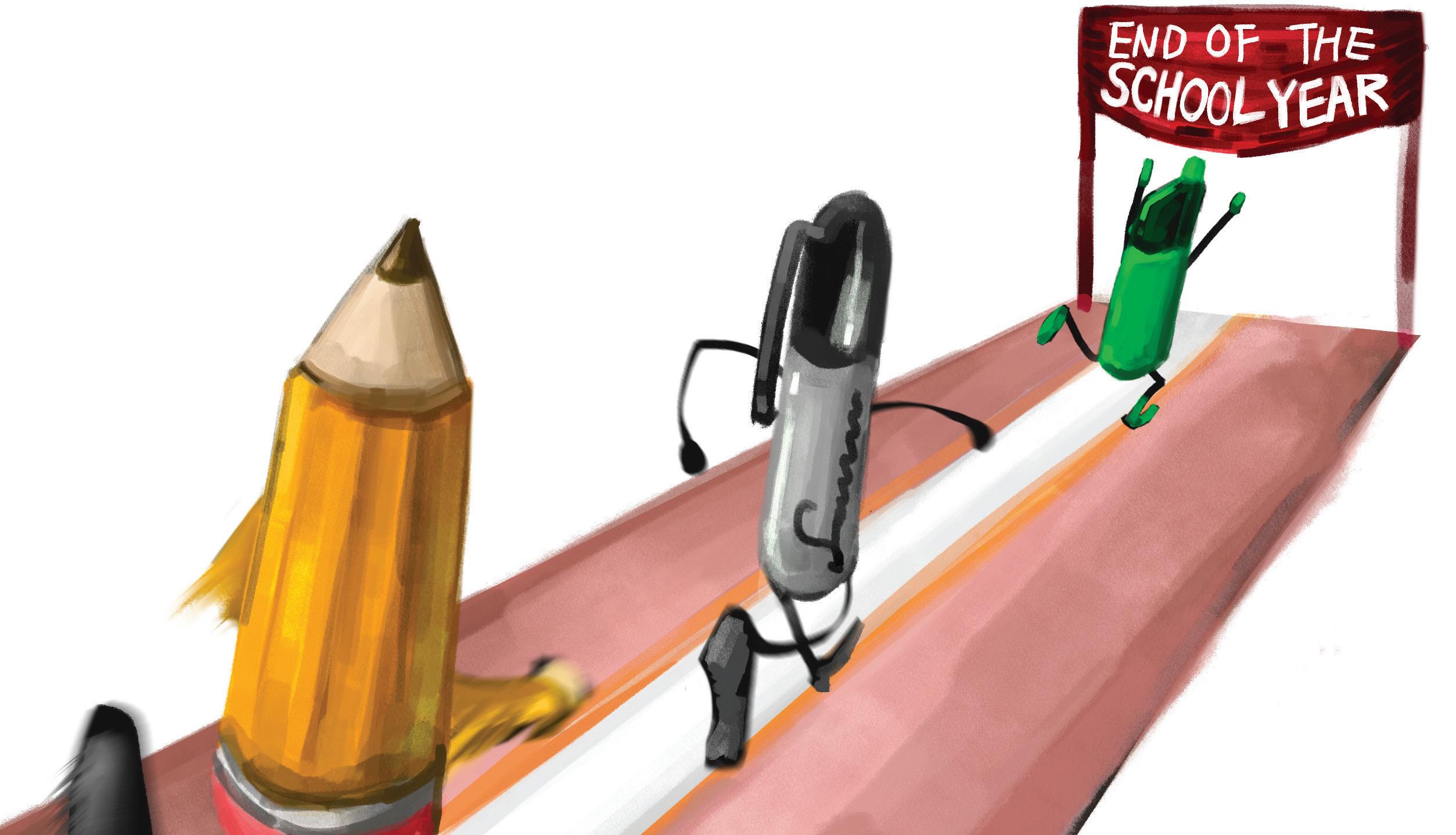
A possible solution to this issue which has been in discussion for many years is replacing AP courses.
Matthew Ives, head of the history department, said, “There are a lot of possibilities out there, It wouldn’t surprise me if in the next five years, we move to something different, maybe in some departments and not others, or if we got rid of certain AP’s or even added other ones.” However, Ives said that as of the coming school year, no decisions have been made.
Though there is not a solution to this slow down in AP progress on the table aside from teachers’ individual adjustments, and the potential move away from AP courses altogether, students taking the courses have expressed concern. Simonds said, “I know that the Juniors are definitely concerned, and I personally am a bit concerned too”
Science Research takes on WESEF
lYdia EttingEr Social Media Manager
In their first time ever competing in the highly competitive Westchester Science and Engineering Fair (WESEF), Masters science research students won a total of four awards, and at the state level fair, New York Science and Engineering fair (NYSEF), five awards and two honorable mentions.
Caterina Stoica is one of the 14 NYSEF candidates to be selected to compete in the International Science and Engineering Fair(ISEF) in Dallas, Texas. The process of formulating her topic of interest, collecting and analyzing data, and putting together her poster has taken two years. This long process required Stoica to keep up her stamina, even if she didn’t feel up to the task. “At times I would be really stuck and had trouble understanding the processes and how to approach the data so I would run into a brick wall. At that point in time it was a lot more difficult for me to motivate myself to sit down and work,” she said. Her project’s goal was to analyze the brains of people with autism to see if there were any anatomical abnormalities in their brain structure that could be linked to their symptoms and the severity of those symptoms. In order to do this, C.Stoica had to work with MRI imaging to withdraw data and analyze numerical values. This required that she be somewhat proficient in computer science, a realm that she had little experience in. Although she had to teach herself how to code, it was worth it once she discovered her findings.
“I discovered evidence of structural abnormalities in the area of the brain called the thalamus, the thalamic cortical region, which acts as a control center for processing sensory motor information,” C. Stoica said. “ Individuals with autism have sensory motor processing issues and social communicative difficulties so these abnormalities are likely linked to different types of symptoms and the severity of those symptoms,” she explained.
In the upcoming months she will be attending ISEF to present these findings. In addition to qualifying for ISEF she won the Excellence in Medicine Award from the Westchester Academy of Medi -
cine, U.S. Agency for International Development Award, and the U.S. Air Force Award at NYSEF. Sophomore Michael Stoica, Caterina’s brother, was grateful just for the experience of attending. “I knew that coming in as a sophomore it would be more than okay to walk away just with the experience and not necessarily any awards so I was just honestly so stoked with how much I came away with,” he said. In the end, he left WESEF with two awards: Science Teachers Association of New York State Congress award and first place in the Plant Sciences category at WESEF. He additionally placed third place in the Plant Sciences category at NYSSEF. His project is about ash trees facing infestation with the emerald ash borer, which is an invasive beetle that has endangered ash trees in the US. He set himself up for a challenge because he was looking for a way to find an early infestation detection which is impossible to know if in the early days of infestation a tree is compromised. He first learned about this when he found that two trees in his neighborhood were being cut down because they were deemed safety hazards and were going to be cut down. This engendered his interest because he realized a research project involving ash trees could give him the unique experience of conducting research and collecting data outside rather than in a lab.
According to Gremski, sophomores make up less than one percent of the total competition so the fact that M.Stoica won three awards is quite impressive. M. Stoica had a piece of advice for any upcoming sophomores interested in science research. He said, “Just go for it because it is so much easier when you have so many years
8 FEATURES
TOWER/MAY
& ARTS
academic finish line

ahead of you and there’s no pressure to gain an award. So just really seize the opportunity and appreciate being the underdog in the competition.”
Although it was Gremski’s first time guiding Masters science research students for the competition, she felt confident in her students’ capabilities. “Last year I was completely new to this. I was very lucky that last year the students who joined the class were already highly motivated and wanted to do a high level of research,” she said. Gremski additionally underscored the high level of competition at the fair. She said, “The public schools in Westchester are the powerhouse of science research for the entire country. WESEF is supposedly the biggest science fair besides ISEF in the country. It is bigger than the New York City fair and even bigger than the entire state of California.”
According to Gremski, students Ella Dundas, C.Stoica, and M.Stoica were given the opportunity to rehearse their presentations from one of the WESEF presidents at the competition and get advice.
Although Caterina was grateful for the advice from the WESEF president she feels more grateful for the long term help of Gremski. “Kristina Gremski has been really crucial in cultivating my interest and keeping me organized. She was there to keep me on task to keep me up with the deadlines and really push me to get everything prepared and ready for the science fairs.” Caterina said.
Business Dynamic class starts final projects
Soon to grace Masters campus will be four new student-run businesses ranging from a delivery service to a cornhole tournament. Every year, the Business Dynamics class as a final project is split into groups to create and execute a business plan with real money. Taught by teacher Hank Kim, the class has studied the ins and outs of different businesses and the economy and generated real profits with businesses on campus.
“The purpose of this project is for students to understand what it takes to start a new business in a very small scale market without the risk of losing their own money,” Kim said.
The class is split into four groups with each business having three or four
students. Together the groups have to brainstorm potential business ideas before narrowing down to one and presenting their business proposal to the class.
In a process similar to the TV show Shark Tank, the groups request a certain amount of money, which Kim will reject or accept based on the idea’s strength. “Based on my judgment on feasibility and the profitability of their proposal, I will decide to give them a certain amount of money or not,” Kim said.
This year the four projects are a cornhole tournament, an on campus food delivery service, a Spanish ice vendor, and a schoolwide party.
The aforementioned cornhole tournament, which has been named Bean Fest, is unsurprisingly a cornhole tournament that will require an entry fee of $10 per person, but that is promised to have a grand prize according to one of the group members, senior Jordyn White.
“There’s going to be 20 teams competing over two days before the
championship which will be held on a separate day,” White said. The group also noted that there will be a concession stand and music as a part of the festivities.
Another product soon to grace the Masters market will be Piragua. “Our idea is to sell Spanish Ice because since the weather is getting warmer and Brock doesn’t always open the ice machine, we think that providing a way to cool our students off will be popular,” Jack Li, one of the members of the group selling Spanish Ice, said. Spanish Ice is ice doused in different flavors of syrup that is promised to be delicious and more than likely popular on campus.
Brock Bussers is a service that will deliver any dining hall, cafe, or vending machine snacks, meals, or drinks to anywhere a student needs on campus. Similarly to the Spanish Ice group, the bussers hope to capitalize on the warmer weather as students prefer to sit outside rather than indoors.
“The main goal is to create a deliv-
ery service to make our peers comfortable and let them enjoy the sun,” said one of the bussers, senior Jack Borwick.
The final group– JBC Incorporated– plans to host a giant party that the whole high school would be able to attend given they pay the entry fee. “We will host a Masters party because we feel like students often want to have a social event that’s fun and open to the whole high school,” senior Rachel Mafuru said.
The event would allow the whole school to enjoy a party together, something that is usually reserved for Semi Formal.
All of the groups will attempt to create a service or product that the community would enjoy buying or using.
“We try to serve some kind of desire, some kind of need, some kind of niche in the community that is under served,” said Kim. “So if students wanted certain things but they couldn’t get it otherwise, we try to find a good method for fulfilling that need.”
1, 2023 FEATURES & ARTS 9
noah KassEll-Yung
CHANA KIM/TOWER
Lead Sports Editor
Junior Mckarthy Grimes wins
On the subject of the film’s message, Grimes said the original concept was on “how the disturbing and traumatic things in life are more profitable monetarily than authentic pieces of work, so it was more about capitalism.”
Apollo invites listeners on a journey to a magical land
character based on himself (creatively named Apollo), his no-nonsense squadmate Arthur and a character known only as Captain. The former two are training to be in the Mazmus, and the latter has been in the Mazmus for a very long time. Captain is su-
Night In Domita,” which serves as a primary source account of one of the most devastating attacks on the human population of Cazilor, the fall of Domita. The narrator of the song had taken his love on a romantic night out for their anniversary when
Canvas, New York Alliance
Film Festival award-win-


ning short film directed by Mckarthy Grimes, starring Charlotte Gaines, is a must-watch. The film follows a painter who creates art based on the world around her until she witnesses something that shakes her reality, making her question if she should stand by this principle of authenticity or repress what she has seen for the sake of what she considers beauty.
The student director captures this moral dilemma in a way that spirals, descending into anarchic beauty. The cinematography encapsulates a range of tones, at points being light and artistically inspiring. In the same breath, it is able to be ominous, eerie and full of heart-racing tension. Visuals aside, “Canvas’” use of classical music is a choice that may catch an audience off-guard at first, but eases you into a world of complexity as the final artwork is revealed.
Later in the process, however, Grimes’ film went into a different direction. Grimes commented that to survive in the world, one must create. The painter in the film intakes so much of the world around her with an opposite output. “The reason the paintings don’t feel authentic is because they’re, lying, not accepting the truth of evil in the world. But in the truth is the positive side,” Grimes said.
The truth is truly in the details, the viewer seeing as the painter does: a flower through a camera lens. The rest of the scene beyond the lens is up for the viewer to imagine. No two people will have the same experience of the film. It will leave you asking yourself to what degree art should imitate life in all its intricacies whether you are an artist or simply a person navigating through your own metaphorical lens. If you are looking for a thought-provoking short film to add to your watch-list, “Canvas” is the way to go.
It is often said that music can transport you to another world, and with his sophomore album “Tales From Cazilor”, Iowa-based singer and songwriter Naethan Apollo does just that. If Apollo’s name is familiar to you, that may be because you’ve heard some of his other songs which got famous on TikTok, such as “Lemon Lime Lips” and “Person In The Mirror.” This time around, though, he is taking us to Cazilor. Cazilor is a world that Apollo created for the cover art of his first album, “Hello World”, and in “Tales From Cazilor”, Apollo strives to give the listener a glimpse into this world. He even hired four voice actors to voice the characters of the album in order to create an immersive experience. “Tales From Cazilor” contains seven scenes, as well as six songs titled “Cannibal,” “Night Watch,” “You’re Not Welcome,” “Do What I Gotta,” “I Don’t Get Sleep” and “Summer Night In Domita.”
Cazilor is a war-torn world of humans and giants. The giants to the east, ruled by Toltag, want to exterminate all humans, while the giants to the west, ruled by Ginsi, believe that humans should be treated as equals. The war that ensued as a result of this debate has been going on for what seems like forever to the people of Cazilor. After a while, the humans wanted to be a part of the action rather than just being bystanders, so Ginsi created the Mazmus, an army in which humans and giants fight side by side against Toltag’s forces.
The whole album plays out in a conversation between Apollo’s
pervising the younger soldiers as they are on a night watch, and they are passing the time by having conversations. Each scene (except for the last one) has some kind of connection to the song that comes after it; for example, in the first scene Apollo asks the others what their fondest memory is, and Captain says that his is the day his ex-wife died.

The song that comes after Captain expresses this sentiment is “Cannibal,” which is something that Apollo does not write often: a break-up song. He characterizes the addressee of the song as a “hungry, hungry cannibal” who “feeds off [his] attention” and commands them to “starve.” Since Apollo’s angrier music is so rare, it’s like a treat to his listeners. I quite enjoy this one; it’s catchy and a great song to scream along to.
One song on the album I find myself coming back to again and again is “Summer
the attack happened, and he stated that as long as he had her he would be fine. The most heart-shattering line of the song was “I looked at my
hands, they’re holding hers tight, but looked up to her, she’s nowhere in sight.” Every time I hear this song, I have to hold back the urge to cry. Another such song is “I Don’t Get Sleep.” First of all, that title is so relatable. I, too, don’t get a lot of sleep. But also, the wordplay is great; I never would have thought of rhyming “diamond” with “find it.” All in all, I have to hand it to Apollo: he gave us a flawless album with no skips, a cohesive story, lovable characters and lots of wordplay. I’d give anything to listen to “Tales From Cazilor” for the first time again, to relive what it was like to fall in love with the world Apollo created. If you do listen to this album, though, I advise you listen to it in order, the way it is meant to be experienced.
Jordan Peele Directs Another Memorable Film Way of Water: A work of art you’ll only look at once
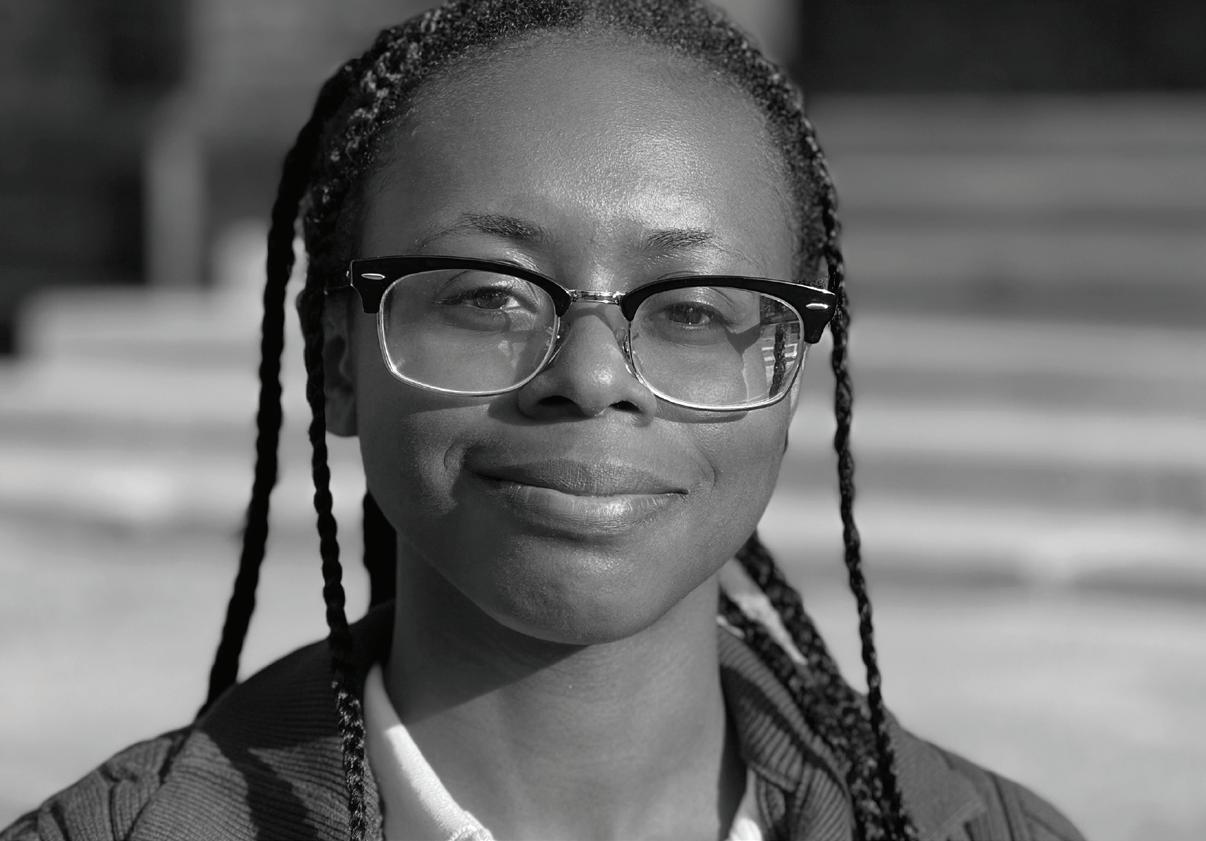
My favorite Jordan Peele movie, and maybe the most underappreciated, is his 2022 film “Nope”. For me this movie checked all the boxes: Afro-Surrealism, non-gory horror, sci-fi, and cowboys.
It stars Keke Palmer and Daniel Kaluuya, who play siblings that own a horse ranch. The two are forced to outwit a mysterious UFO, using what they know about wild animals. The actors are incredible throughout the entire movie.

You may have recognized Kaluuya from his role as Wikabi in “Black Panther” and “Black Panther: Wakanda Forever”, but he has starred in another Peele movie, “Get Out”. He will also voice Spider-Punk in the Spiderman movie that is set to be released in June of 2023. Clearly, Kaluuya can play a broad set of characters.
The same can be said for Palmer, who has appeared as the voice of Peaches in many Ice Age movies, but also in thrillers like “Cleaner”, and even the classic “Grease Live”! (remake of the 1978 film and play), the iconic romantic comedy.
They both have unmatched ability when it comes to slight changes in facial expressions, or delivering a
punchline that has a deeper meaning. This movie often moves from lighthearted scenes to heavier or more intense scenes abruptly, and Kaluuya and Palmer are able to match that pace.
After watching this movie multiple times, I continue to notice details in the sets and dialogue previously overlooked. Whether it’s the stitching on a jacket or the name of a horse, there isn’t a moment in the film that isn’t laden with details.
Another element of this movie is the stunning visuals and sound design, thanks to Johnnie Burn. The settings are incredibly memorable and what appears on screen by the end of the movie is unlike anything I’ve seen before. The sound design complements each scene perfectly, in one scene it becomes hard to untangle the score from the actual sound effects, and in another they play something akin to what you would hear in a spaghetti western, but in a way that doesn’t feel clichèe.
What I appreciate about this movie is the fact that it serves as an introduction to a lot of genres. As I said before, despite the horror elements, it isn’t hard to watch and, as with other Peele movies, it falls under the genre of Aafro-Surrealism. The genre of Afro-Surrealism is a genre that focuses on showcasing and exploring the perspectives of African Americans through often shocking or fantastical imagery and themes. , in Nope it is obvious in some moments of the feature, but in others less noticeable.
This movie has made my top ten list, and it’s by far my favorite of the ones released in 2022. If you haven’t seen it yet, you absolutely should.
The Na’vi are back, everyone! After the release of the original “Avatar” back in 2009, fans have been waiting anxiously for a sequel. With its dynamic characters, all-star cast, and real world message, the first “Avatar” was an automatic hit. Its popularity only grew after Zoë Saldana - the actress that plays Neytiri - appeared in the Marvel Cinematic Universe as Gamora. In fact, it is the highest grossing movie of all time by almost 200 million dollars.
The original “Avatar”, directed by the prolific James Cameron, followed Jake Sully (played by Sam Worthington), a former Marine paralyzed from the waist down as he takes his twin brother’s place on a mission to Pandora, an alien world with a highly poisonous environment. To combat the toxic air, scientists have created Avatars; human/Na’vi hybrids. Using one of these Avatars, Jake goes down to Pandora with the mission to kill the natives, but ends up falling in love with a Na’vi named Neytiri and saves her tribe instead.
But, as everyone knows, there’s always one major challenge with sequels: how to create something that measures up to the first.
Here’s the thing. The original “Avatar” was stunning but “Avatar: Way of Water” is a work of art. In the 13 years
since the first Avatar came out, CGI technology has improved by leaps and bounds and now has the ability to create settings that look as real as the world right outside our windows. The visuals in “Way of Water” are breathtaking to say the least. The scenery is so lifelike and compelling that you can’t help but get sucked in almost instantly. Another plus? Jake and Neytiri are parents now, with four rambunctious, sassy, troublemaking kids. Their family moments are wholesome and adorable and you will want to hug the youngest one.

So what’s the downside? Well, the movie is over three hours long. Now, the first “Avatar” wasn’t much shorter at almost two hours
and 45 minutes, but that extra half hour makes a huge difference. As someone who most definitely cannot sit still for that long, the runtime is a major drawback. While we want to explore Pandora and see the beauty that is “Avatar”, we don’t need three hours! To make matters worse, they could have cut at least a half hour of content without losing any major plot points. It’s unsurprising that “Way of Water” ended up being one of the most expensive movies ever at over 400 million dollars with this amount of footage.
This movie is a work of cinematic artistry. It is a once in a lifetime look into a gorgeous fantasy world. But that’s what it is; a once in a lifetime experience.
THE ALBUM COVER FOR “Tales from Cazilor” is inspired by the famous game Dungeons and Dragons. Apollo released his first single “Love Heist” in 2020.
10 FEATURES TOWER/MAY 1, 2023 DISNEY PRESS AVATAR WAY OF WATER introduced many new characters including Ronal pictured above. Avatar Way of Water started production in 2017 but release until 2022. Reviews Read these reviews on the latest blockbuster films, hit albums and student made films.
Chanel neal Contributing Writer aurora horn Lead Copy Editor ayalah Spratt Contributing Writer
ellie hiSe Contributing Writer KALUUYA STARES
171
award in local film festival
INTO THE distance while riding a horse in this scene from Nope. The movie ammassed
million dollars n the U.S. box office.
“
I’d give anything to listen to Tales from Cazilor for the first time again”
IMAX/UNIVERSAL PICTURES SPOTIFY XAVIER ROLSTON/TOWER CANVAS
- Aurora Horn ‘24
IS DIRECTED BY JUNIOR Mckarthy Grimes pictured above. She uses a plethra of shots from around the Masters Campus.
Flashing red lights and sirens blared when Upper School History teacher, Andrew Lopez, went through a yellow light between Sunnyside and Lyndhurst in Irvington. Lopez had been pulled over by the police. Though fear did not fill his body, anger did.
After a long day at work, Lopez took the usual route home to pick up his kids from school before winter break. Given that Lopez takes this route almost every day, he knew that there was construction near that specific light and police were stationed nearby. As Lopez approached the light, he noticed it turn yellow but he was already too close to come to a full stop, so he accelerated forward to catch the light before it could turn red.
Soon after Lopez drove through, he was pulled over by the policeman that had been stationary near the light. The officer claimed that he had gone through a red light, which is a moving violation that adds points to his license.
Lopez explained what he did when he was pulled over. He said, “I rolled down the windows, took out my keys and threw them on the dash, turned on the interior lights, and took out my wallet and put it on the dash.” He continued, “That way everything was in front of me. Whatever the police officer needed was in front of me and visible so that way I wasn’t reaching to my waist or reaching into the center console. And he could see inside the car immediately.”
Lopez said he strongly believes that he didn’t run a red light, though the police officer claimed his body cam showed him running it. Lopez didn’t argue with the police officer, he didn’t curse him out, and he didn’t call him a liar; he simply said that he had
If you can’t read the plate, you must vacate
not done it and would appear in court.
“I knew that the officer was lying. I don’t like the idea that police officers get to lie to people with impunity. It makes them dishonest actors with the public, ” Lopez said.
Lopez then was surprised to read that the ticket was written for something different than what he had been pulled over for. Instead of a ticket for running a light, he received a non-moving violation for his license plate being too dirty to read.
“I know that it is a little faded but it’s an eleven-year-old license plate. It’s readable and legible,” Lopez said. He continued, “Meanwhile, when I’ve been driving around now I have

noticed that other people’s license plates are much less legible than mine. There are many that have peeled off paint and numbers that are missing, that you can’t read and they’re just driving around with it,” Lopez said.
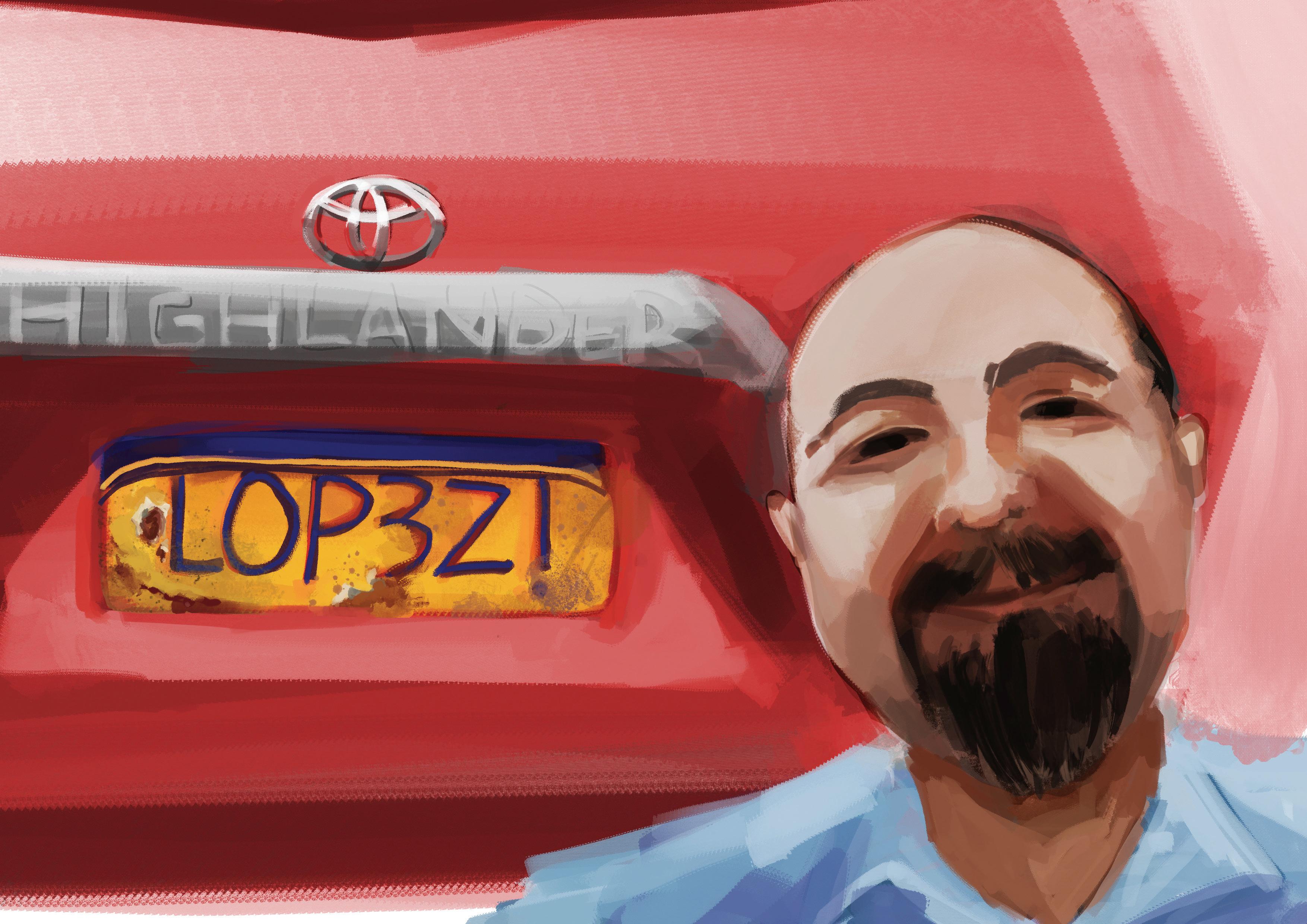
When Lopez was given the ticket for the dirty license plate, he asked the officer if he wanted him to clean the license plate. Lopez said the officer responded with “No, it’s weird.”
After this event, Lopez consulted with Upper School History teacher and former corporate litigation lawyer, Ben Thorn. Thorn offered his ad

gating or spending time to go to court to fight the ticket would be more of a hassle than paying the minimal fine.
Thorn said, “My initial thought was that he should pay the ticket because it was a non-moving violation and I didn’t think it would be that much money.” He continued, “The headache of litigating and spending time to go to court and fight this [ticket] would be worth more than the minimal fine,” Thorn said.
However, Lopez was determined to fight the ticket. After about three months and extensive
had expected. Lopez said he had contacted the town clerk prior to his court date and even planned what techniques and arguments he was going to use, but his case was simply dismissed when it was his turn
I knew that the officer was lying. I don’t like the idea that police officers get to lie to people with impunity. It makes them dishonest actors with the public.
- Andrew Lopez
because the ticketing officer did not fill out the proper paperwork.
Lopez would not need to pay the ticket – but he was not happy about the end result. He described what it meant to him. He said, “I didn’t have to pay anything. I’m not guilty. I’m not innocent. They just stopped prosecuting me. It just incentivizes policing to behave this way, which is petty.” He continued, “This is not how a police officer should behave. I wanted my day in court. Now it still feels hollow, because they dismissed my case because of a paperwork error.”
Lopez recounted this story to his 11th-grade U.S. history class. He explained, “I was highlighting the fact that Frazier v Cupp (1969) allows police to engage in “deceptive interrogation” tactics – which they now do in a lot of interactions with the public. So when a police officer says “that’s a lawful order” or “you have to provide ID”, sometimes that’s not true and you don’t. They use our unfamiliarity with laws and our civil rights against us. And they shouldn’t. Even on the little stuff – like ‘dirty license plates.’”
Junior Jennica Pereiras, one of students, noted how his story relates to what they are learning, and the impact his sharing his story had on her. She said, “Recognizing roots of racism and systemic racism is so important, which is exactly what Mr. Lopez did when he told us this personal story. He came to class and was honest with us, which we really appreciate from him,” Pereiras said. She continued, “His authenticity as a teacher is what really makes his class more comfortable and relatable to everybody. Not every teacher would share that personal experience. But the fact that he did, really makes a difference in the learning and putting it in perspective with what’s going on in the world right now,” Pereiras said.
TOWER/MAY 1, 2023 FEATURES 11 LiLy Zuckerman Features Editor
NOTICE WARNING
ANDREW LOPEZ INCORPORATED HIS own recent run in with the police to illustrate a lesson he was teaching to his U.S. history class. Some students appreciated the real life example.
“
FREE CONSULTATIONS & SITE WALKTHROUGHS Our Services Daily Building Maintenance Janitorial Services Between Case & Operating Room Cleaning Electrostatic Spraying & ATP Testing Terminal Cleaning Steam Sterilization Post-Construction Clean-up Window & Glass Cleaning Floor Care, Carpet Care & Restoration 24/7 Emergency Response 914-915-9062 aluiso@servocind com July 27, 2023 Why Us? Who We Serve Educational Facilities Medical Buildings / Hospitals Residential Commercial Office Industrial Mixed-Use Warehouses Hotels Retail Assisted Living / Retirement Homes 55 Years in the Industry Same Ownership 24 Hour Service Daily Building Maintenance Union & Nonunion Capabilities Fully Insured OSHA 30-hour trained cleaners Specialize in Medical-Grade Cleaning & Sterilization
AI generated images and democracy
 Alex A Murphy
News Editor
Alex A Murphy
News Editor
In the days following Trump’s indictment, memes, commentary and criticism populated social media algorithms across the country, creating a forum by which Americans could respond to the recent presidential drama. Among the posts that gained the most attention were photos depicting sensational scenes of the arrest: Trump fleeing the scene, Trump in handcuffs, Trump fighting the authorities. The only problem: Trump hadn’t actually been arrested by the time those photos were posted.

Eliot Higgins, founder of an open-source investigative outlet

called Bellingcat, tweeted artificially generated photos of the Trump arrest (which had not yet happened) which were the result of uncomplicated prompts like “Donald Trump falling down while being arrested.”


Twitter flagged these images for containing potentially misleading information, but not before they reached upwards of 5 million views.
“I think that fake news is a really big problem already, especially since we’re in an age where people prefer to look rather than read, it’s even easier to deceive people into believing certain things,” said Caleb Tuckman, secretary of Bridge USA, the political discourse club on campus. “The only reason I knew the Donald Trump thing wasn’t real was the Twitter thing below it, and like, I fully thought it was real.”
The first major AI art system, AARON, was developed by Harold Cohen at the University of California San Diego in the late 1960s. The invention served as an answer to Cohen’s initial quandary: “What are the minimum conditions under which a set of marks functions as an image?”
Although AARON produced mostly abstract, black-and-white images throughout the 1970s and 80s, the caliber of artwork churned out by the technology steadily rose as more was learned about the programming. Similarly, as the United States and the international community experience a heyday of artificial intelligence, techies have a uniquely high-quality selection of automated art generators at their disposal.
Companies like NightCafe (which was used to generate the


graphic for a previous Tower AI piece), Hotspot.ai, OpenArt, and Dall-E 2 have capitalized on a newly developed digital art market, even as they frequently offer their services at low or no cost. Higgins had used one of these photo generators, Midjourney, to promulgate photos of a fictional Trump arrest.
Higgins tweeted the prompts he entered to yield the various viral images. “Donald Trump falling over while getting arrested. Fibonacci Spiral. News footage,” he wrote.
To critics, calling for heavier regulation of potentially misinformative AI images, this represents a fatal flaw of artificial intelligence-based policy. To advocates, easy access to image generation services represents hope for future development of artificial intelligence technology.
“Image generation, prompt generation, text generation uses well-defined problems, like I want a photo of Kanye wearing a funny costume, or I want a paragraph written from the perspective of Donald Trump saying this, this, this, and this,” Stone Yan, Engineering and Robotics teacher, said. “So those are well-defined problems, and so if AI can help us do that, then that frees us for more creative work or critical thinking problems that require humans to make decisions rather than spending a lot of time in the weeds doing research.”
That is to say, AI may be able to help policymakers solve the problem that AI-generated images or text may raise by freeing up more time for genuine problem solving.

But for consumers,
Tuckman advises that caution and adequate media literacy can help prevent the rapid spread of misinformation, and create spaces for more productive civic discourse. “We have to be careful and we have to check our sources, and I think that that goes with Trump being arrested, but it can affect medical spheres, it can affect criminal spheres, in terms of tampering with evidence. It’s really important that we’re more aware, not only of the media we consume, but the ways we apply it to other things,” he said. “We should take AI and use it for good, and even as a lesson. Like, ‘see that picture? That’s not real.’ I think it’s something that can be used to educate and thus bring people together.”
ILLUSTRATIONCREDIT

SterileMed is leading the way in the new-age of cleaning by fusing technology with exceptional service. In addition to our traditional janitorial services, we offer innovative cleaning solutions with a strong focus on disinfecting and sterilizing high traffic facilities. Our leadership team has over 50 years of experience in the cleaning industry and is a preferred vendor to countless offices, major hospitals and big box retailers. Whether you run a small office, large building or even a warehouse, we can provide you with a customized cleaning solution to keep your facility running beautifully.




12 FEATURES TOWER/MAY 1, 2023 Real vs. AI, can you tell? TWO OF THESE PHOTOS are generated by AI. One of them is real. Can you tell which one is real and which ones are fake? Scan the QR code to see the answer.
FULL SERVICE COMMERCIAL GRADE CLEANING 77 Tarrytown Road, White Plains NY 10607 www sterilemed org Janitorial Services: Complete Maintenance Programs Disinfecting & Sanitizing Services Day Porter Services & Lobby Attendants Floor Care & Restoration Post Construction Clean-Up Window Treatment 24/7 Cleaning Services Industries We Service: Professional Office Buildings Residential Condo, Co-Op & Townhouse Developme Healthcare Centers Educational Facilities Children’s Centers Senior Housing Developments Retail Health Clubs & Gyms
PHOTO CREDIT TIM YANG/TOWER and MIDJOURNEY
Encourage AP Course Enrollment

Continued from page 7
Finally, to encourage more students to enroll in AP courses, the schools should provide the resources and support they need to succeed. Some of the initiatives Masters may consider borrowing from other schools may include peer tutoring centers, expanded office hours, or even professional tutors assigned to students.
Amaris Asiedu ’23 said she was very lucky to have a lot more people of color in her AP Literature class as compared to the predominantly white AP Environmen -
tal Science class she was in last year.
“In AP Lit [representation] is especially [important] because you have to talk about books like “Beloved” and “Americanah”, and a discussion flows more easily because now there’s people who can actually relate to the book,” Asiedu said. “So it’s not just [white students] saying what they think and maybe saying something ignorant. It makes it so much easier [for me] to talk about certain topics, and it also allows for other people to learn about things they may have not learned about before, about other people’s experiences.”
Asiedu’s experience in AP Lit
A student’s journey up Mount Kilimanjaro
tial to making his experience run more smoothly.
class should be a normal occurrence, rather than an exception. Expanded course offerings, supportive teachers, easy-to-navigate course selection process, and accessible opportunities for preparation to higher-level classes are just one of various interventions that school districts and independent schools have already started implementing to tackle the inequity in the advanced classes. Masters should learn from those examples and catch up with other schools in implementing systemic changes to its curriculum and approach to teaching.
How Brock brings culture closer to the students through food
to connect people through food. And so, if you have an opportunity to have someone that maybe has never tried a cuisine from another country or another culture, it kind of bridges that gap.”
Xavier rolston Web Editor
Masters students achieve many remarkable feats during their independent time, setting goals for themselves and challenges they hope to overcome. One such feat was junior Samuel Navin’s recent spring accolade — climbing the summit of Mount Kilimanjaro.
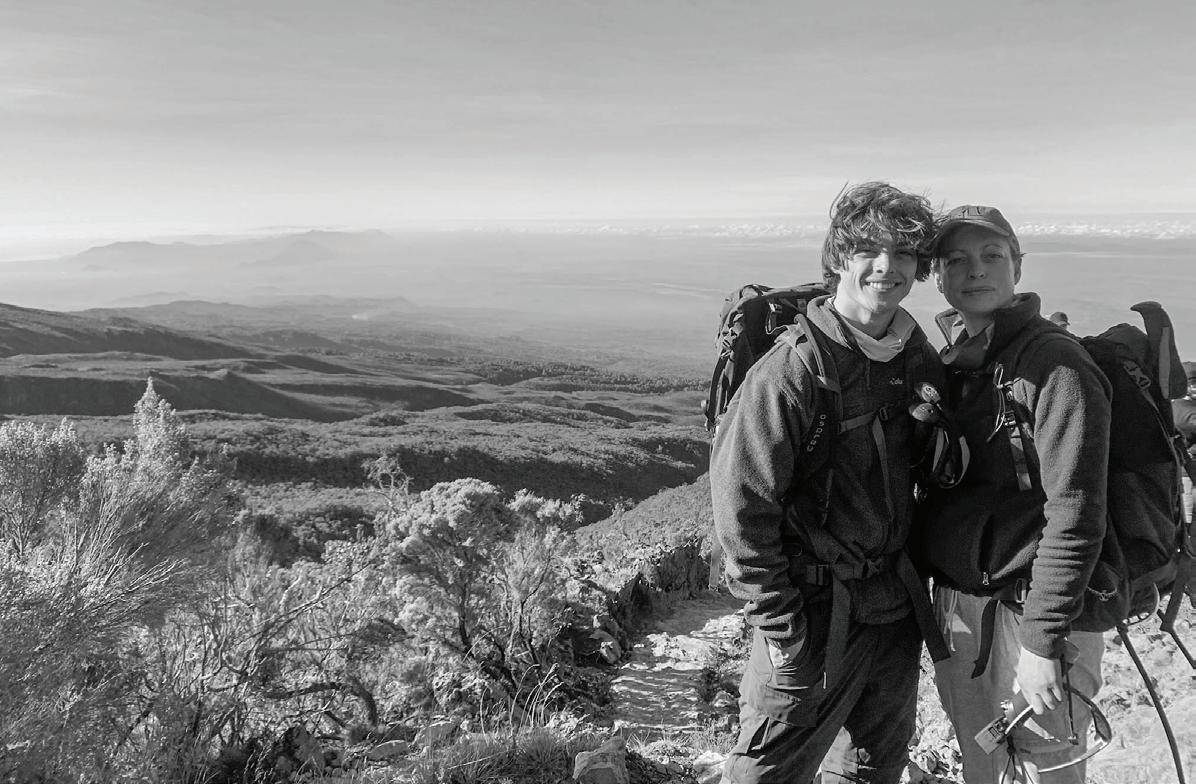
Located in Tanzania, Mount Kilimanjaro is one of the most topographically prominent peaks on Earth, standing at a towering height of 19,340 feet, making it the tallest mountain in Africa. The hike is just under 40 miles long, and takes five to nine days to complete.
Navin said climbing Kilimanjaro had been a dream of his for a while, and climbing the summit this break was a huge accomplishment for him. “I’ve always had the dream of one day climbing the seven summits — the tallest mountain in each of the seven continents,” he said. “And that’s one down for me now.”
“Before this, I had really never done a climb at that altitude, and I’d mostly done hikes and climbs nearby with my mom,” he said. “I went to the gym and wore a weighted backpack on a stair stepper. I bought and broke in new hiking boots. Nothing could really prepare you for the altitude though — that you just have to take as you go.”
Despite rigorous training, the hike itself proved challenging. Navin explained, “It’s definitely the hardest thing
group do it as well is really what keeps you going,” Navin said. “You have to give 150% of your mental fortitude, and without everyone else around you also climbing there’s no way anybody could individually do it.”
Navin was nothing short of grateful for the life-changing experience, and the people that helped guide him during the journey. “There wasn’t a single person there who wasn’t one of the nicest people I’ve ever met in my life. It would have been impossible without the porters and guides helping us along the way. It was
Food connects the world and brings people closer together. In the Masters community dining hall food has the important role of helping students discover the diverse cultures and experience that comes with the cuisine. Not only do the international students include their culture in the Masters community through international dinner but the kitchen staff also tries to invite the students into their cultures on a daily basis.
Sophomore Sophie Moussapour described her experience with the diversity of the dishes. She said, “I would say when it comes to incorporating food from different cultures, Brock does a pretty good job. We definitely don’t have pasta every day. I’d say there’s a lot of food from a lot of the countries that the international borders are from which is really nice.”
General Manager of Dining Services Lee Bergelson explained why he tries to diversify the menu. He said, “I think it’s important to try to highlight some of the foods that come from their home countries to certainly make home feel a little less distant than maybe what it is.”
But even beyond the international students, Bergelson said he thinks having food from many cultures is a way to connect students from any background. He said, “It all feeds into trying to make the world a smaller place where it’s easy
While the background of the students plays a role in the menu, the kitchen staff also has an opportunity to include their own cultural background. Bergelson explains, “What we try to do is really utilize their background and the foods that the kitchen staff is most familiar with as an opportunity for the students to try some of their food.”
Tradition also plays a role when it comes to sourcing the products. Bergelson clarifies “We are lucky to have a lot of vendors that specialize in specific cuisines in certain countries. So provided that I have enough time, and usually I can actually source our products, that one would find a dish specific to their country.”
The kitchen tries to make eating an experience. Bergelson noticed that students are rushing in the dining hall and don’t take the time to acknowledge the details. For some food, there is signage to identify the dish and the background so students get the opportunity to acknowledge the cultural importance of the dish. He said, “So what we really tried to do is make the process of walking to the dining hall, not just an eating experience, but alerting. So if you take the time to relax and not always have to rush, there’s opportunities to take in some of that stuff.”
Another way of including culture in the community is international dinner. Students get the chance to cook traditional food from their home country
for the Masters community. Moussapour describes her experience of international dinner. She said, “So I tried a lot of new food from different cultures I’ve never tried before. I had a national dish of Egypt, which is really cool. I had an Australian pavlova, which was delicious. I’ve never had it before and now I crave it every day.” As a student who lives in the US she appreciates getting the opportunity to try food from cultures she hasn’t tried before and international dinner is the perfect place ≠for that.
Brock Kitchen supports students by providing guidance and ingredients during the International Dinner event.
Chana Kim is a student from South Korea cooking at International Dinner. She said “They were giving a lot of advice. They were helping us a lot. It was actually my first time actually cooking for somebody else and it was a big amount.”
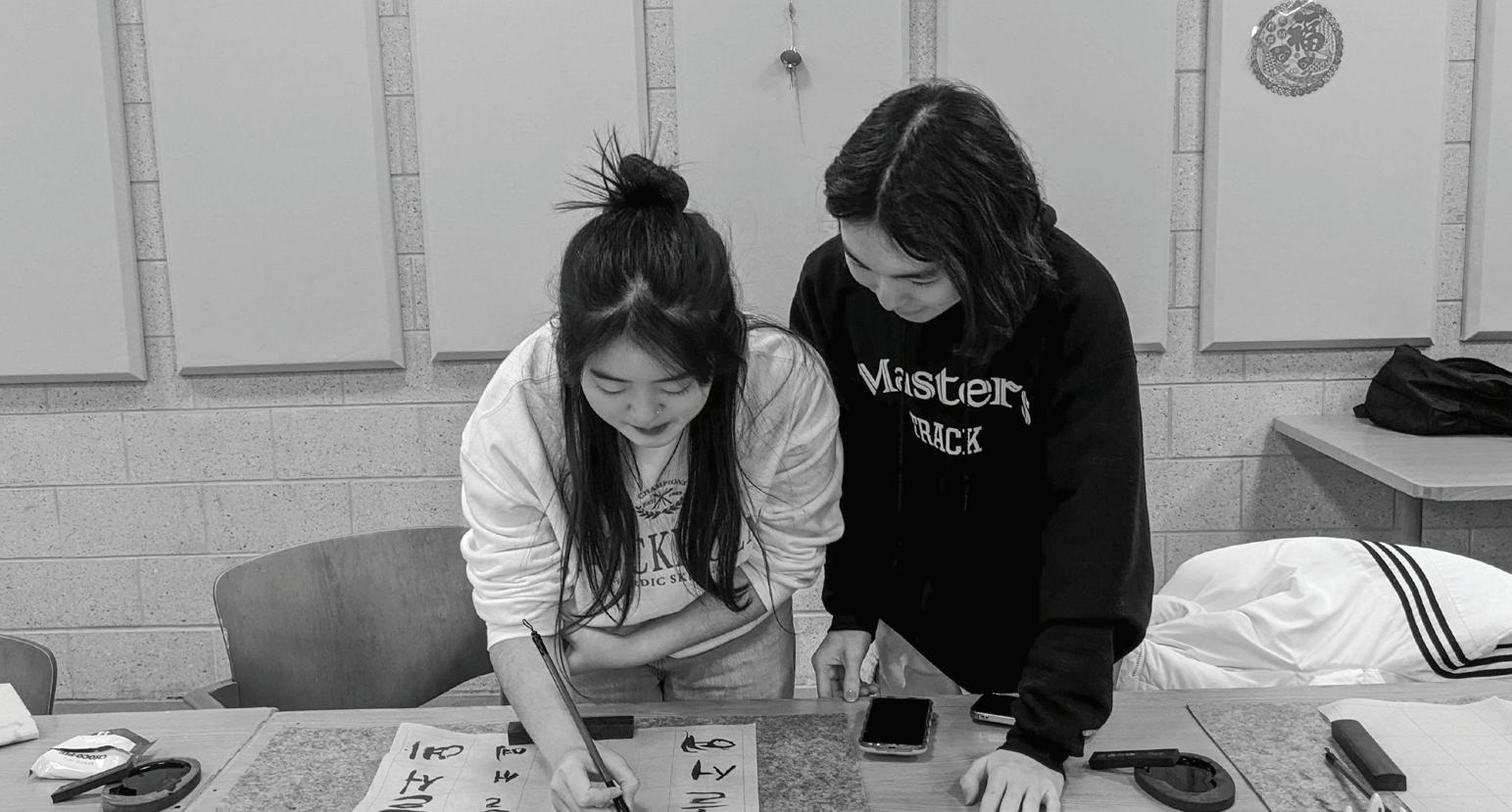
It is an opportunity not only for the students but also for the kitchen staff to get to know new recipes and cultures. Kim appreciated cooking for the school community at International Dinner. “It was a good experience to actually cook and give it to somebody else and have the experience of sharing my culture to other people.”
Kim thinks there is still improvement that can be done to make the international food taste more local. “I hope they can include more international foods that are in the right recipe and with the right ingredients. Because even though I made Korean food for international dinner it still kind of tasted different because of the ingredients.”
Crossword

This passion has been one of Navin’s for a long time. He explained his interest in hiking and backpacking was sparked years ago with a summer immersion experience. “I started going to an adventure camp in the Catskill mountain range starting in sixth grade. We learned basic survival skills, we learned how to camp and how to cook, and went climbing in the Catskills,” Navin said, “I fell in love with climbing and backpacking, and just being immersed in nature.”
On Navin’s particular route, which lasted seven days, over one-third of Kilimanjaro climbers didn’t make it to the top. Preparing for the hike took months of training, which Navin said was essen-
I’ve ever done. Physically and paired with the altitude, it was very strenuous, and you tire up very quickly. The pace is less than half of normal walking pace.
The physical struggle was notable for Navin, but he explained that mental fortitude was perhaps the most important part of his journey.
“Definitely on summit night, I think everybody thought about giving up every second of the way there, including me. Seeing the other people in your
AAPI Month
really cool meeting so many people and seeing how the other side of the world lives,” he said.
Masters students are constantly daring and striving to accomplish seemingly impossible challenges and goals they lay out for themselves. Navin says he encourages everyone to take on their challenges and goals, which may just become life-defining experiences.
by Viviana Simon
→ Across:
1: Telephone to telefone; 1 down to…
5: A name or holiday song
6: New Orleans
7: Witty remark
8: The truth, according to Mulder
9 and 10: Two-word equivalent to “Uno reverse”
12: Urinary tract infections, quickly
13: Salt, in French
14: The seventh deadly sin
→ Down:
1: Throw up, by a name
2: A doubled-up exclamation meaning “Oh me oh my” in Japanese
3: Opposite of “hi”
4: A bad friend or Cadbury
5: “The devil’s tango”, formally
6: Cashew, or occasionally candy-coated
7: “Senior…”
8: It is on us, frequently
11: The blue planet
15: Sick
TOWER/MAY 1, 2023 FEATURES 13
ASIAN AMERICAN PACIFIC ISLANDER heritage is celebrated during the month of May. Chana Kim ‘25 and Youri Lee ‘23 celebrate Lunar New Year in the Sharon Room in the imaged pictured above.
Philine hellrieg
Contributing Writer
SAM NAVIN/TOWER
SAM NAVIN STANDS NEXT to his mother at a peak on Mount Kilimanjaro. Navin aims to climb the seven tallest mountains on each continents.
ROBERT FISH/TOWER
See answer here
Sandra Liu Social Media Manager
This coming summer, Masters students will get the opportunity to visit Senegal and study Senegalese history and culture while staying with host families from the affiliated school Cours Ste. Marie de Hann. Masters has had a deep relationship with Cours Ste. Marie de Hann even before COVID-19 began. Every year since 2016, students from Cours Ste. Marie de Hann have come to Masters for exchange study, and in the summer time, Masters students go to Senegal to experience a different culture. Although COVID-19’s
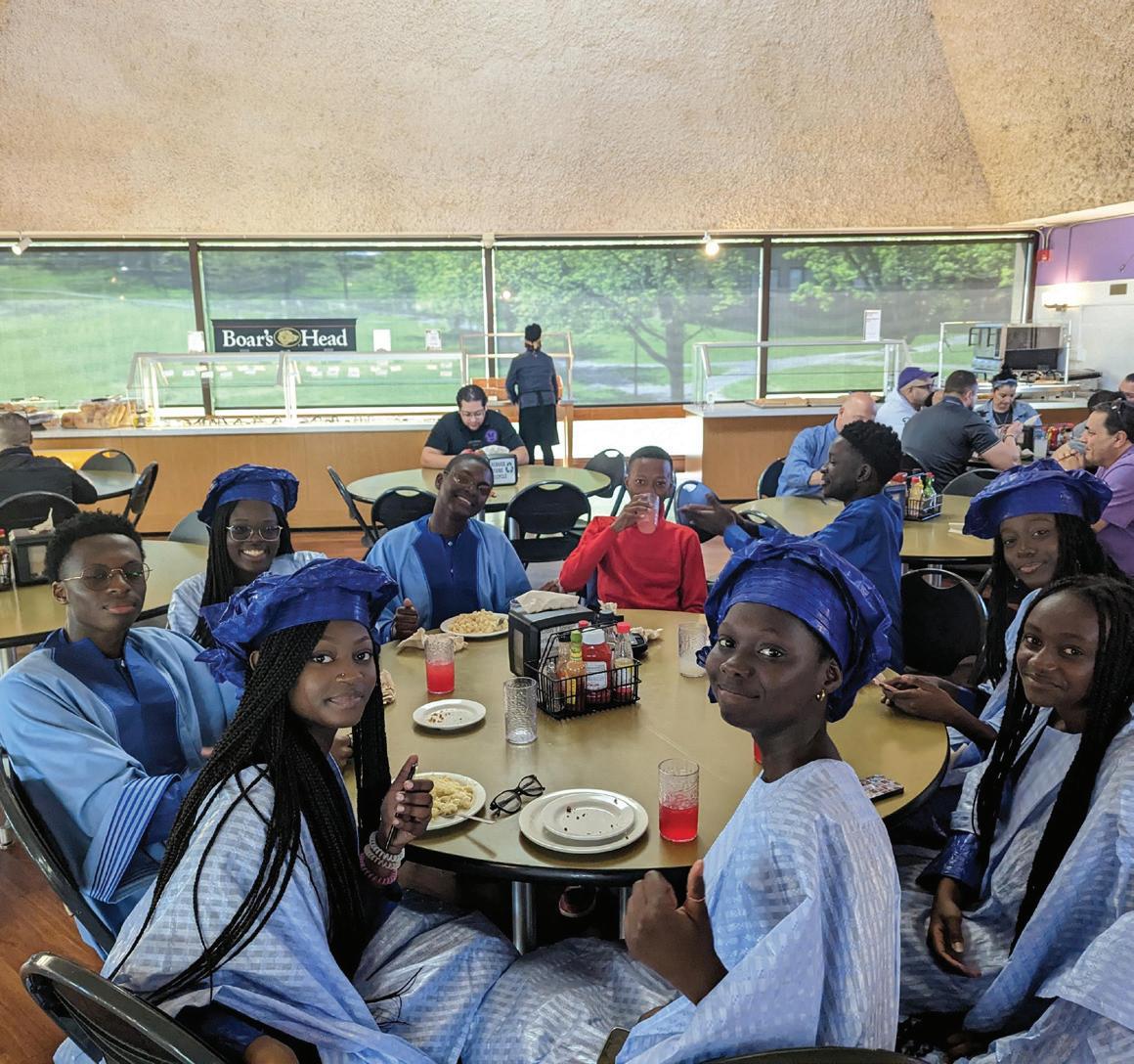
arrival briefly interrupted the project, the project is about to restart this year.

The trip’s highlights will include a camel ride, a visit to an island built entirely of seashells, and a visit to the African Renaissance Monument, the continent’s tallest statue.

The students will attend five to six orientation classes regarding the host country’s culture, behavioral requirements, and trip logistics before departing. They will also discover a question that they want to study during the program in order to enhance their exchange experience. The focus of orientation will be on team-building exercises that will benefit students living overseas.
“During COVID, people were very cautious and everything shut down. Traveling was a whole big concern. So I think we started to do international
again because people are feeling safer. The students with our sister school, they have good medical care in their country. And now it’s time. Otherwise, we don’t get to experience another culture, another way of livwing. And that’s so important,” said Ms. Shell M. Benjamin, the Upper School dance teacher who will also lead the Senegal trip.
“Thirteen students will attend the Senegal trip. The student will stay in the host family’s home.
The whole point is that they get to see what life is like in Senegal as a teenager. We will go to Gorée Island which has the Doorway of No Return, the last place an enslaved would be in their homeland. And we will be helping paint a nursery for part of our Community service. The sight, the smells, the food, and the market will also be part of our trip. And you have to bargain in the market. Moreover, we will go to a desert, experiencing camel rides. The trip will be amazing,” Benjamin said.
“I am so excited for the Senegal trip, and our information sessions have been a really great way to create a tight cohort to travel there as well. There’s some great people going with me, and I can’t wait to practice my French in Senegal! As for the Senegal kids that are here right now, I have been talking to a lot of them since last week, whenever I see some of them I try to stop and talk when I can, and I’ve learned a little about a few of them, including their names and their Instagram. I want to build a little bit of a connection while they’re here so when I go to Senegal and their school, I’ll have some people to look forward to seeing again,” Aron Tucker, a junior who will attend the Senegal trip this summer, said. Masters students will have the opportunity to gain insight into different cultures and experience the traditions of other countries.
mances and reflections about their time in the boarding community. Performances included the steel pans/kettle
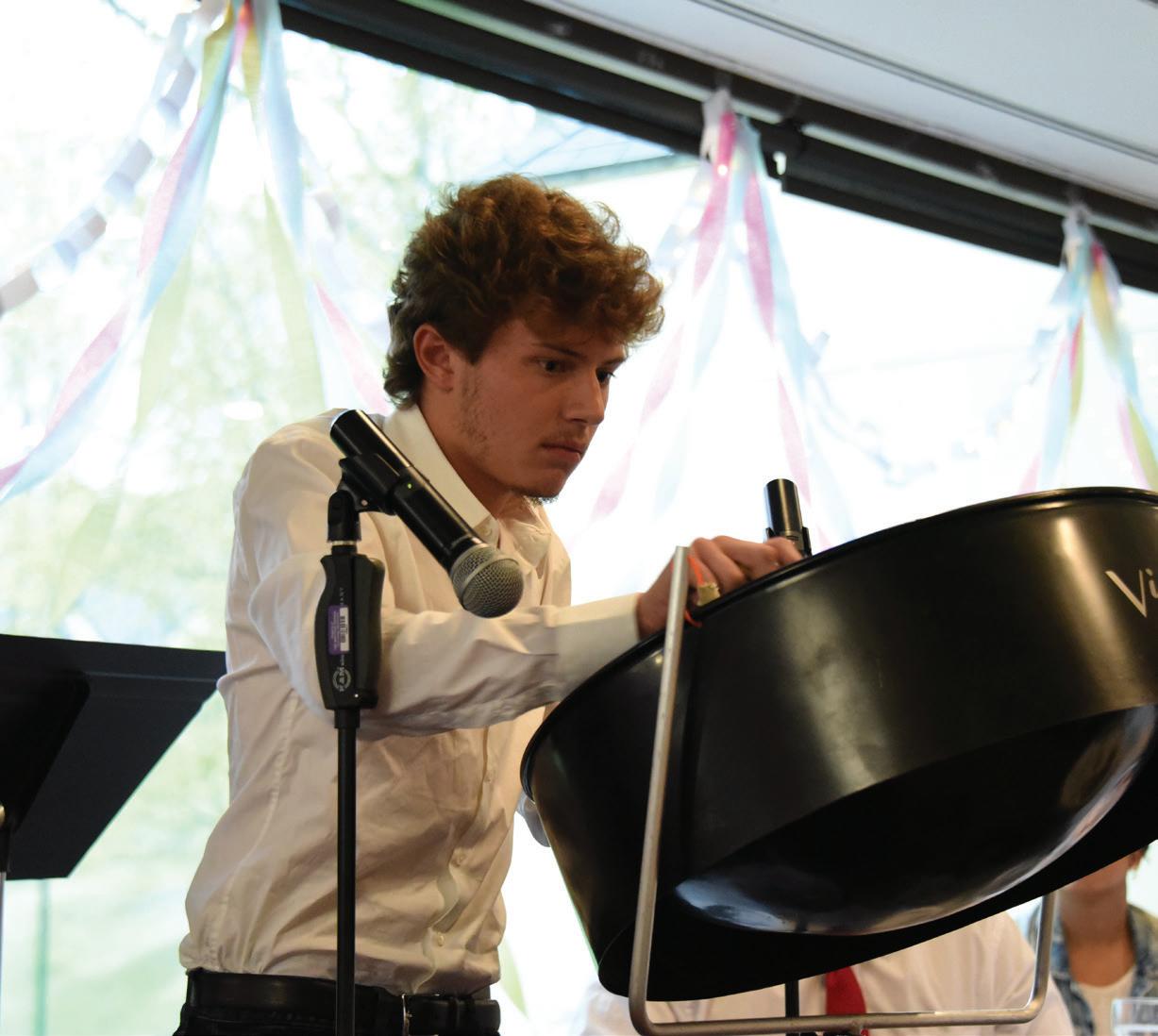
Simone.
THOMPSON DORM HOSTED THEIR community dinner on Saturday, April 26. Many students did musical perfor-
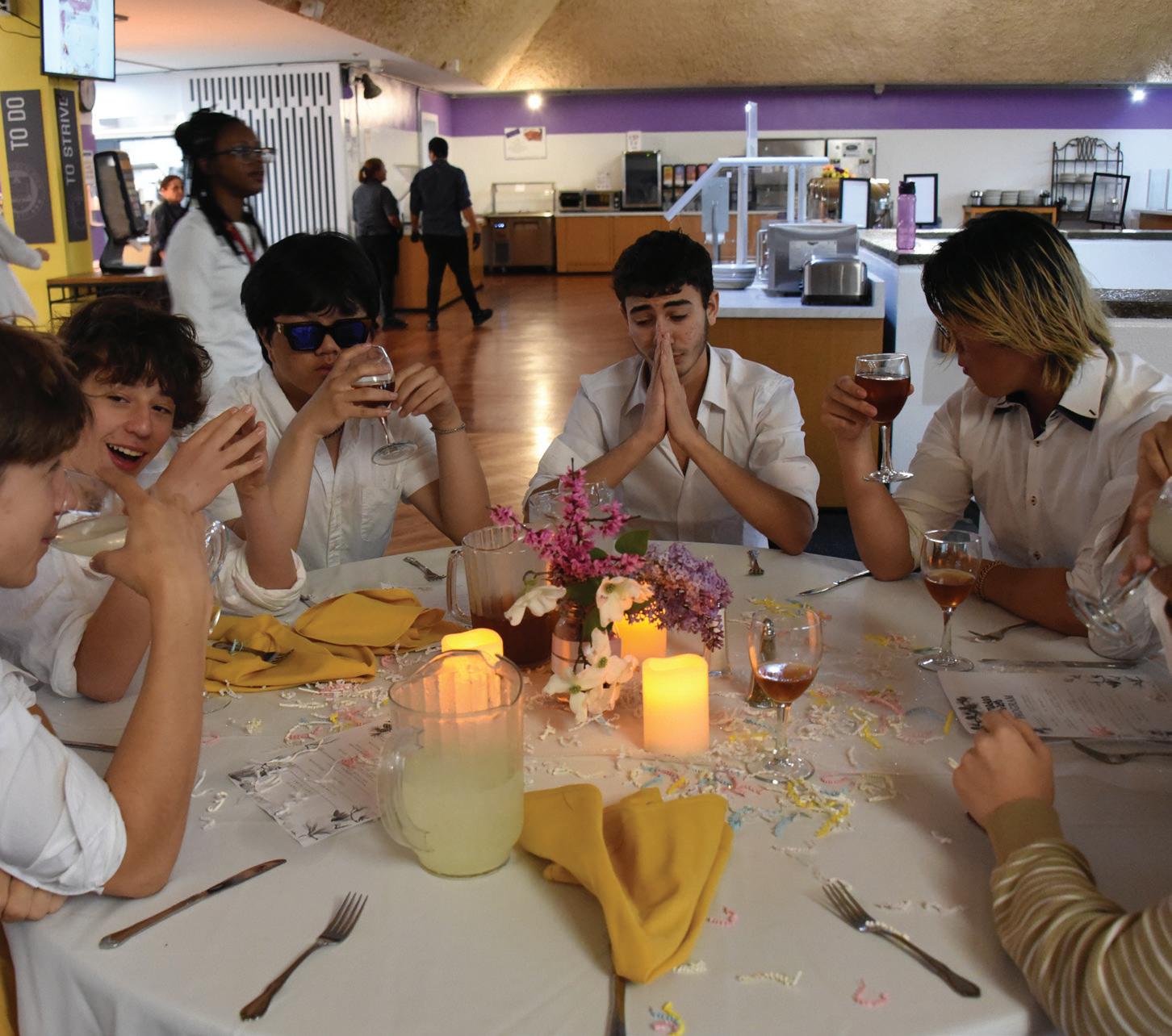

drums by Leo Schilling ‘24 and Ehimare Ehikioya ‘24 sang and played on guitar a cover of “Feeling good” by Nina
COMMUNITYDINNER




4.22
You’re invited
Students at the dinner dressed in white formal wear. Dinner was flank steak, potatoes, and truffle ravioli.
14 FEATURES TOWER/MAY 1, 2023 O R D E R O N L I N E W W W M E X C H E S T E R C O M 1 3 C E D A R S T R E E T , D O B B S F E R R Y F A R M T O T A C O ! C E L E B R A T I N G 1 8 Y E A R S T M
ROBERT FISH/TOWER SENEGALESE STUDENTS CELEBRATE EID AL-FITR at the lunch table. This celebration marks the end of the two month fasting period of Ramadan. Each students dons a Boubou, a clothing traditionally worn on Eid.
RYAN GUAN/TOWER
Cocky vs. confident: Crossing the line in sportsmanship
Maia Barantsevitch Editor In Chief
As the clock slowly ticks down toward zero, tensions begin to rise among the players on the basketball court. The buzzer sounds, prompting either immediate joy, or a surge of disappointment and defeat. These strong emotions in the world of sports often prompt “trash talking.”
On April 2, NCAA Women’s Final Four in basketball was a boon for women’s sports, with record audiences tuning in for Friday’s semifinals and Sunday’s national championship game between LSU and Iowa. But rather than celebrating LSU winning the finals game 10285, the audience left the gymnasium recalling a certain provocation that LSU’s Angel Reese repeatedly directed towards Iowa’s Caitlan Clark. Reese was seen approaching Clark at the end of the game waving her hand and pointing to her ring finger, indicating that she is going to win the championship ring, and yelling “You can’t see me” , a well-known quote from the wrestler John Cena.
friendly, competitive banter, and rude, unnecessary language during a sports game?
Women’s basketball player, Dakota Daniello, has been playing basketball for 14 years, and has experienced the intense atmosphere of these sporting events throughout her basketball career. “I’ve had times where things would get heated, where me and somebody else would exchange words, but it wasn’t cocky, it was competitive because it was a close game,” Daniello said.
But the boundary that separates friendly banter from insulting verbal attacks, is keeping the conversation within the realm of the sport.
“There are sort of unspoken rules in these situations,” Daniello continued, “If it’s personal attacks outside of basketball like someone’s relationships or family, then yeah, there could be a line crossed. But if it’s just about the game, I don’t really have a problem, it just fosters competition.”
If it’s personal attacks outside of basketball like someone’s relationships or family, then yeah, there could be a line crossed. But if it’s just about the game, I don’t really have a problem, it’s just fosters competition.
- Dakota Daniello‘23
The situation between Angel Reese and Caitlin Clark is a prominent example of the internet’s ability to exploit and heighten circumstances as simple as a basketball game.
mates face. It’s really hard to hear and really hard to keep yourself back, because of course you want to be respectful. Definitely, over the years that is something I learned playing at Masters, and my coach really supported me and my growth as a player.”
The energy of the crowd, and the intensity of the game would also alter Chrysanthopoulos’ attitude while playing.
“Like the crowds this year. When we went to away games, the crowds would be saying things that were not fun to hear. Especially when you’re just in high school and a lot of people don’t know how to handle those emotions. But I had to turn it into motivation, like, ‘oh I’ll show them,’” Chrysanthopoulos said.
IOWA GUARD CAITLIN CLARK at the freethrow line shooting after being fouled. She had an amazing junior season campaign for Iowa averging 27 points per game and breaking the NCAA women’s March Madness Tournement scoring recorded. She also won Nation Women’s College Basketball Player of the Year. Dispite scoring an impressive 30 points in the championship game, Clark was mocked by LSU foward Angel Reese after Iowa’s heartbreaking ing loss to the LSU Tigers.

Videos of this interaction blew up on social media overnight. People all over twitter began bashing Reese for her gestures towards Clark. American sports commentator, Keith Olberman, responded to a video posted of the moments after the game ended, calling Reese a “F***ing idiot” , while others such as football player, Emmanuel Acho, stepped up to defend Reese’s actions.
But this incident opens up a discussion to a much more general debate: what draws the line between
The team to beat in the N.L. East: The NY Mets
Matthias Jaylen Opinion Editor
The National League East is by far the most competitive division in all the Major League Baseball (MLB), though there are really only three contenders to win the division and play October baseball. Those three are the New York Mets, the Atlanta Braves and the Philadelphia Phillies. Despite these three in serious playoff contention, I believe that the New York Mets will move on to beat the East.
The amazin’ NY Mets are currently 14-9 just finishing a dominant West Coast trip, sweeping the Oakland A’s, winning the series against the Los Angeles Dodgers, and splitting the series with the San Francisco Giants. The Mets offense is booming with first baseman Pete Alonso leading the charge on the offense. Last year, Alonso, an MVP candidate, hit 40 home runs and led the majors with 131 runs batted in (RBIs). Through the first 23 games of the season, Alonso has kept his MVP form so far with 10 home runs, 23 RBIs and much improved defense. Alonso is on pace to be one of the best hitters in the majors again and potentially win his first Silver Slugger and MVP. The other star of the Mets, Francisco Lindor, has also had a strong start to the season. The star shortstop has been one of the best defensive and overall best shortstop in the league. So far Lindor has racked up 18 RBI with 4 homers. He’s also picked up 11 walks through the first 23 games.
The Mets have also been stellar on the defensive side of the ball. With great defenders all around the field with Starling Marte and Brandon Nimmo in the outfield, and stellar defenders McNeil and Lindor in the infield they will finish top five in defense again like they did last year. Though the Mets are currently injury riddled, when fully healthy, they are the best team in the majors and have the best pitching rotation in the majors. They will soon get back ace pitchers Justin Verlander and Jose Quintana. When healthy, the Mets genuinely have three aces in their starting rotation and two future Hall of Famers with Scherzer and Verlander. This team is full of star power, veteran leadership,

depth in all positions, and new young faces like promising top prospects Brett Baty and Francisco Alvarez.
On top of them having the best fans in baseball, they are certainly the team to beat.
The team that will most likely place second in the division is the Atlanta Braves.
The Mets overall have the best team in the division and arguably the best team in the entire MLB. I believe that the team is so strong that they will go onto win the National League Pennant and go on to win their first World Series since 1986.
Though they finished in first place last year, they had the same record as the Mets (101-61) and they have only gotten worse since. They pose the biggest risk to the Mets, but I’m not worried about them at all. The loss of their star shortstop Dansby Swanson to the Chicago Cubs makes them a much worse team. They lost a lot
of his all-star level offense as he hit 25 homers and 95 RBIs while batting .277 last year. They also lost his elite defense playing short. His replacement Orlando Arcia just won’t be able to match any of that offensive or defensive production at all. Their pitching rotation is nothing special either. Other than promising young pitcher, Spencer Strider, the Braves have one of the weaker pitching rotations in the N.L. East. The Braves have a strong infield with superstar Ronald Acuna Jr. but their outfield isn’t as strong as the Mets. They have a good team, but the Mets will just overwhelm and overpower the Braves with their star power and depth.
My pick for third in the NL
Daniello Said, “[the situation] is somewhat unnecessary to be honest. They are both great players, and I mean, they’re both the best players in the tournament. They both had the confidence that in games such as the finals, are justified.”
Junior, Nayia Chrysanthopoulos, has been on the Masters girls’ basketball team since her freshman year, and has learned the importance of maintaining patience on the court. She said, “During home games, actually, some girls would get in my face, or get in my team-
Daniello and Chrysanthopoulos were both coached by Andrea Fischer, director of admissions, during winter sports this school year. Fischer believes that there should be respect between players if any taunting happens during a game. She said, “I can see the value in light taunting if mutual respect between teams and players has already been established, which often does not occur unless players on opposing teams have a personal connection or have played against one another in the past. Though, it’s easy for anyone to get caught in the moment. As a coach, I’d rather see my team and players focus on their own game, their own dynamic and their own game plan.”
Looking back at the LSU v. Iowa State game, Fischer is able to see both sides of the team’s disagreement.
“Without knowing the players personally, it’s hard to really have an opinion. I see both sides. Women’s basketball has made tremendous progress, this year alone, in terms of attention, publicity, etc. I think it’s a shame that LSU’s win, and such a highly viewed game for women’s basketball, has become overshadowed,” Fischer said.
Two teams on the green
Marianna Gu Lead Features Editor
As the weather warms up, who wouldn’t want to play golf on a warm sunny day at the range? This year, as more students joined the varsity golf team, coaches Robert Fish, Jack Stevens, and Gregory Schlapp decided to separate the team from co-ed to two different teams by gender. Fish said, “In the past years, a number of our female players have expressed that they didn’t feel like it was actually a fair competition of skill when our rival team is mostly male-dominated. So this year, we decided to split up the team given that it is more fair to our players and that we have enough male-identifying and female-identifying players that we could actually make two teams.”
During weekdays, students have the opportunities to practice in the Game-on Range, which is about 15 minutes away from our campus; if the weather does not permit practicing outside, students often practice with the simulator in Strayer Gym. Normally, the coaches would select a few students to follow the match, meaning that they will not be competing but are given the opportunity to play on the course.
bers on the team improve. Stevens said, “Though we have separate boys and girls teams for matches, we practice as one group. I continuously see our players, no matter their gender or skill level, leaning on one another for support and advice about their swing or fundamentals while in the cage and at the range. During our girls’ match against Rye Country Day I was impressed with the confidence and demeanor of each player throughout the round against a team who had more in-match experience.”
Girls’ Varsity Golf Captain Hanna Florian said, “The Masters golf team in general is such a welcoming community and I have had so much fun at practices and games. I think it’s good and necessary that we have a girl’s’ team because it allows us to play more at our rhythm and gives us the opportunity to represent our girl golfers. Also it gives more chances to golfers to have time on the course. I think coed practice allowed us to connect more with the entire team like traveling and playing in games together. However, we do have time to bond during practices.”
East is the Philadelphia Phillies. On paper, they are a much stronger team than the Atlanta Braves. Their pitching rotation with the 1-2 punch of Wheeler and Nola with former Met Taijuan Walker on the back end of the rotation is spectacular. They are also a great hitting team that’ll always get you lots of runs on the board with players like Bryce Harper, Kyle Schwarber, Rhys Hoskins, J.T. Realmuto, and Nick Castellanos. The only problem plaguing this team is the long term injuries. With Hoskins out for the whole season after he tore his ACL and Bryce Harper who may be limited in his return after Tommy John surgery, they just don’t have enough star power to win the NL East when facing the Mets or the Braves.
The Mets overall have the best team in the division and arguably the best team in the entire MLB. I believe that the team is so strong that they will go onto win the National League Pennant and go on to win their first World Series since 1986.
The coaches also arranged some learning opportunities for students; for example, four golfers are going to a golf clinic at Vassar College on April 21 to learn from the famous Mr. Rhett Myers, a first-rate golf professional. The golf team takes students to the Vassar golf clinic every year to help the new mem-
Sometimes students would go to the range themselves and take lessons outside of school to improve on their skills as more games are coming up in the following weeks; this week, the golf team will host home games in Ardsley Country Club. Mikey Lyu, the new sophomore on the team, said, “I like practicing every day with my team because everyone’s so encouraging and the coaches are extremely helpful. I love golf and I sometimes go to the range to practice on my own so that I can improve faster. ”
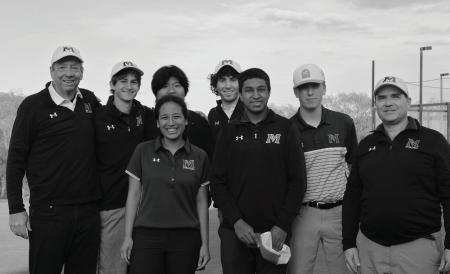
TOWER/ MAY 1, 2023 SPORTS 15
JD Scott Creative Commons /TOWER
“
RIGHT FIELDER STARLING MARTE taking an at bat during Spring Training at Clover Park in Port St. Lucie, Flo. Marte was an MLB all-star in the 2022 season hitting 16 home runs and 63 RBI’s.
Josh Markowitz/TOWER
THE VARSITY GOLF TEAMS celebrates after a successful match on the green. The teams is enjoyig their new look as two seperate programs but are still one community together. The girls team has 13 golfers and the boys has 11.
Alpha Zerfu/TOWER
“
- Matthias Jaylen ‘24
First woman on baseball team steps up to the plate
solutely. Happy to have you.’”
In a sport that is traditionally commandeered by boys, one freshman girl, Maddie Barnes, has changed the game. She is the first and only female player in The Masters School’s history to the best of our knowledge to play on the boys’ varsity baseball team. “At first, I wanted to try a new sport because I was scared to go try out for the baseball team,” Barnes admitted.
When she arrived at the Upper School, the starter was eager to continue her athletic career in her favorite sport: softball.
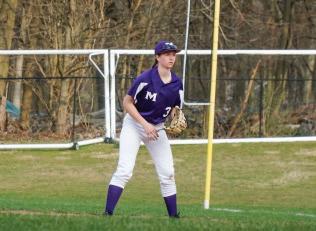
Barnes has played softball since she was nine, and carries one year of baseball experience under her belt. Yet with no playing field, a decrease in student interest and the logistical nightmare associated with practicing off campus, this spring season lacks a softball team, according to Masters Upper School Athletic Assistant Director Mikelle Sacco. Undeterred, Maddie decided to join the boys’ varsity baseball team.
Neil Jaggernauth, head coach of the varsity baseball team, recalled, “She showed up one day during that open gym week and said, ‘Hey, Mr. J, I want to give this a try.’ I said, ‘Ab-
However, Barnes still had to pass a physical fitness test, a feat that all athletes playing in sports not aligning with their gender must undergo. The trial required her to run a mile in under 8 minutes, execute 47 sit-ups in under one minute, and sprint a 10-yard shuttle run in under 10 seconds. The athlete passed the test with flying colors, securing her spot on the team as a catcher and a second baseman.
Barnes is a member of the girls’ varsity soccer and basketball teams, and has been playing for Masters since middle school. “She's incredibly tough, hard working, and just a positive individual,” Logan Condon, director of athletics and physical education, said. While softball and baseball are, from afar, similar sports, there is a significant distance between the details– literally. Sacco explained that the pitching mound is further away from home plate in baseball than in softball, and the bases are more greatly spaced from each other as well, so even though the transition from softball to baseball is not impossible, there is a distinct discrepancy between the sports.
“Well, definitely, the mechanics are different in baseball and softball, so it took some [time] getting used to, especially being a catcher,” Barnes said.
Barnes testified that there was no resistance to joining the team,
and her teammates and coaches have treated her fairly. “I've had a great time so far, and I really like the environment of the team. Everyone's super nice and supportive,” she said.
Zach Gotthelf, freshman cen-
ter fielder for the Masters baseball team, explained that Barnes has connected well with the group. “I think that she completely holds her
own,” Gotthelf, who has been swinging a bat since the age of three, said. Regardless of any nerves, Barnes advises all girls entering male-dominated fields, “Just go out there, show
up, show your interest.” She believes confidence is the key to success, “The one thing that you don't want to do, is just say you're not good, and you can't do it, because you can do it.”
Record number of players leads to first JV Lax team
students tried out for the team attracting new athletes ranging from freshman to juniors.
Girls’ Lacrosse makes Masters History with the separation of a Junior Varsity and Varsity team
For the first time in Masters’ history, girls’ lacrosse has garnered enough interest for the creation of a Junior Varsity team. Before spring break, a record 42
“Last year we knew it was just going to be one team so we just started teaching during tryouts rather than try to look for team placement, in comparison to this year we actually had to evaluate everyone based on their skill level,” said Alexis DiDomenico, the lacrosse coach.
As a requirement of the Athletic department, tryouts lasted for three days, but in the weeks

approaching spring break, many students were given the opportunity to “try out” lacrosse in preparation for the official tryouts. However, she said coaches still had to make difficult decisions in terms of evaluation because of the short time span and sheer amount of students trying out.
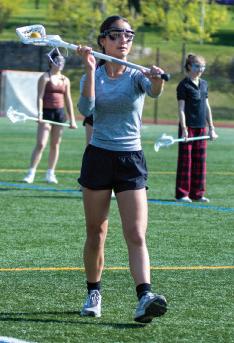
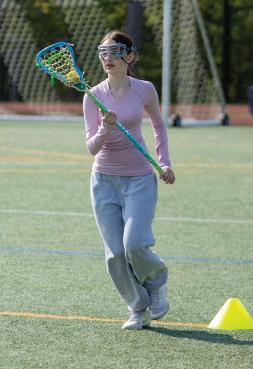
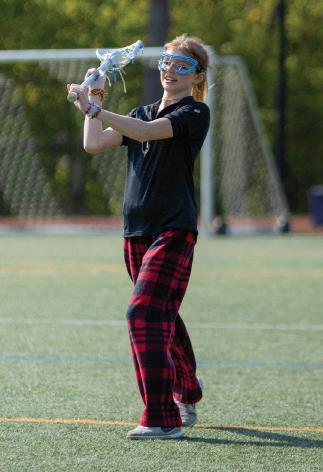
Sophomore and first year student Michelle Nanna was motivated by the competition. “There were a lot of people there so I felt like I needed to show my potential and try really hard to make it to varsity,”
she said. Even though it is her fifth year playing lacrosse she said that she is excited to learn and immerse herself in a new team. She said, “I really like our team. We have good chemistry and are always pushing each other to do our best and are bringing out the best individually and in our team.”
Didomenico shared a similar sentiment. “The energy is great, a lot of our new members are actually juniors, and they have really set the bar high for themselves and are working really hard and we are
super proud of them,” she said.
The new JV team is focusing more on skill building and gaining confidence on the field as it is composed entirely of new members, compared to Varsity where the focus is more on competition and skill building outside of practice. JV co- captain Sienna Morin was excited for the opportunity. She was initially encouraged to try out by her upperclassmen friends and felt further incentivized to try out from the “open play” before tryouts where she
got to practice more basic skills. She also got to meet the coaches before tryouts, which furthered her excitement over lacrosse. “It was fun getting integrated into the group and also overwhelming because of the JV and Varsity divide, but either way I was still interested in playing,” Morin said. Overall, she feels as if the support from both coaches and teammates has helped her grow. “This is all us learning and growing together and that’s why I love it so much.”
16 SPORTS TOWER/MAY 1, 2023 JOSH MARKOWITZ/TOWER
SportS
Isaac Cass/ Tower
NeeNa atkiNs aNd allie Faber
Contributing Writers
“
I’ve had a great time so far, and I really like the environment of the team. Everyone’s super supportive and nice.
- Maddie Barnes
lydia ettiNger Social Media Manager
FRESHMAN MADDIE BARNES STANDS poised in the outfield awaiting a ball in play. The tri-sport athlete has risen to the challenge of playing baseball in the spring after construction and logistics prevented a softball season from happening. The catcher and second baseman commented on the challenges in switching from softball to baseball, but has noted the support she’s received from the team.
JOSH MARKOWITZ/TOWER JOSH MARKOWITZ/TOWER
FRESHMAN ALLIE FABER LINES up a pass in practice on the Greene Family Field. The freshman, is on the team that has players ranging from 9-11 grade.
FRESHMAN DANIELLO LOBL RUNS with the ball in the newly formed JV girls’ lacrosse practice. She was one of the record 42 students that tried out this spring which resulted in the creation of the JV team.
FRESHMAN NOLA HIRDT PASSES the ball during a practice on Wednesday, April 26. She was one of the many players that were a part of the three day tryout before spring break.





















 AdAm Bello Sports Editor
AdAm Bello Sports Editor



 Aviv EmEry Copy Editor
Aviv EmEry Copy Editor











 Alex A Murphy
News Editor
Alex A Murphy
News Editor

































